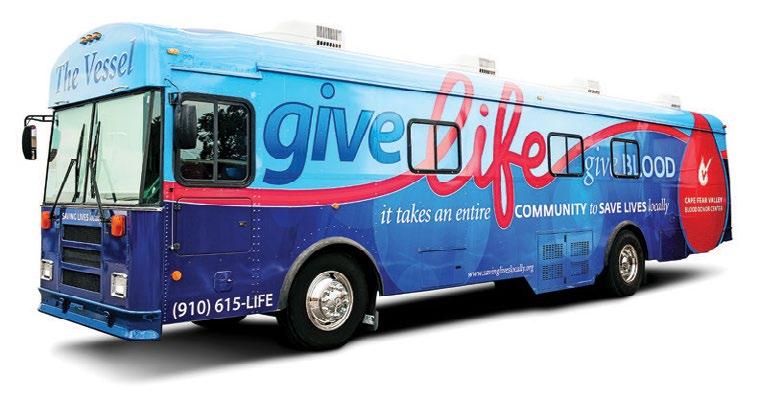




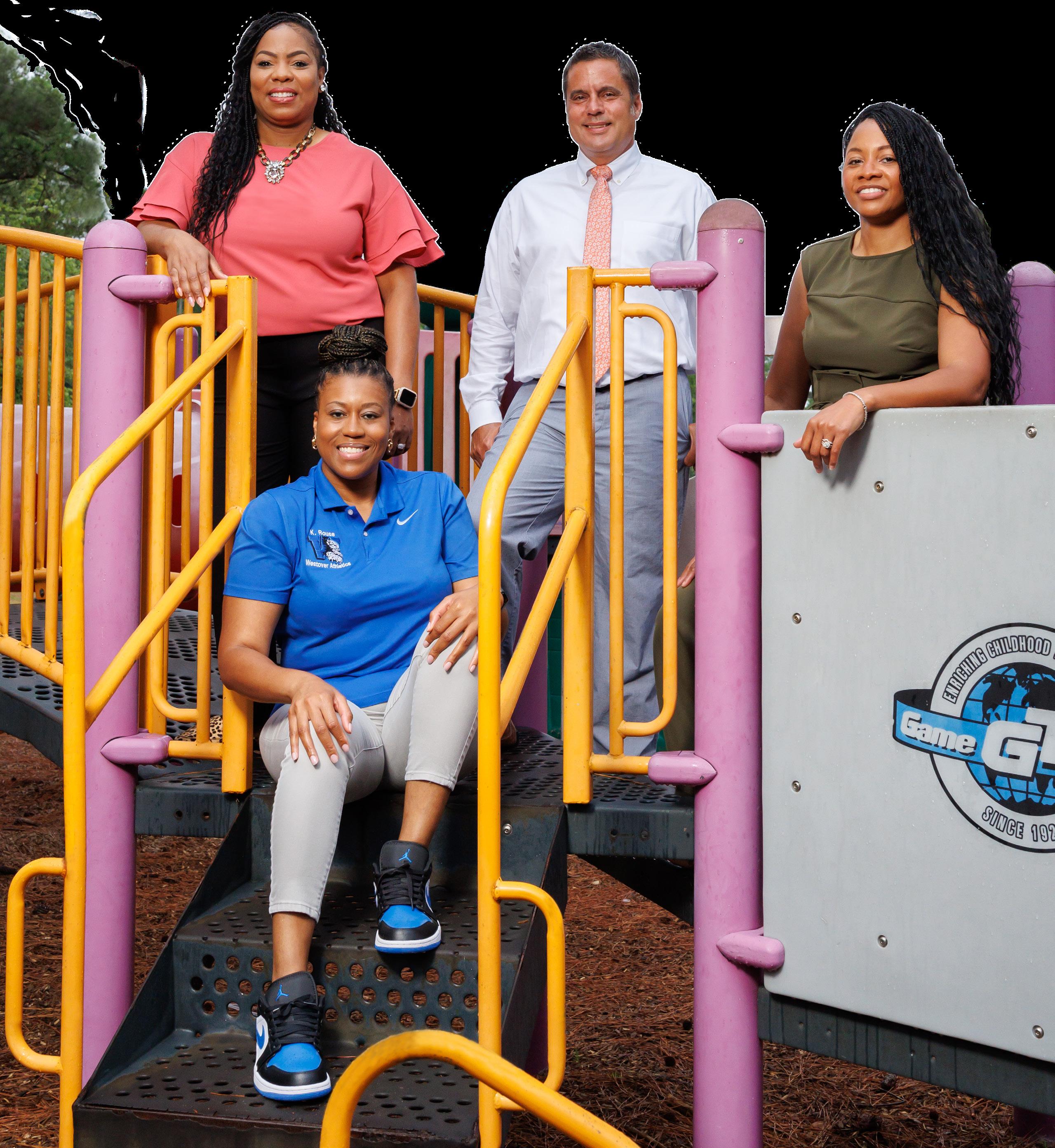




Erica Fenner-McAdoo of Howard Hall Elementary School, Steven Barbour of Terry Sanford High School, Sade’ Mangum from Seventy-First High School, and, seated, Kristle Rouse from Westover High School

Cumberland County Schools’ ‘of the Year’ honorees talk student engagement, staying refreshed
Cumberland County Schools’ Principal and Assistant Principal of the Year finalists share what it means to be considered among the best.
When families attend the annual backpack giveaway, they will leave with much more than school supplies.
Cumberland Community Foundation Scholarship Manager Kimmi Nettles highlights the impact and hyper-local nature of scholarships.
Connecting with community resources is key to helping participants and enhancing their lives.


No. 1, Most Diverse University in North Carolina*
2021-22 & 2022-23
MU offers flexible schedules perfect for working adults, active military, veterans, and their families.



*Niche National Rankings and Reviews
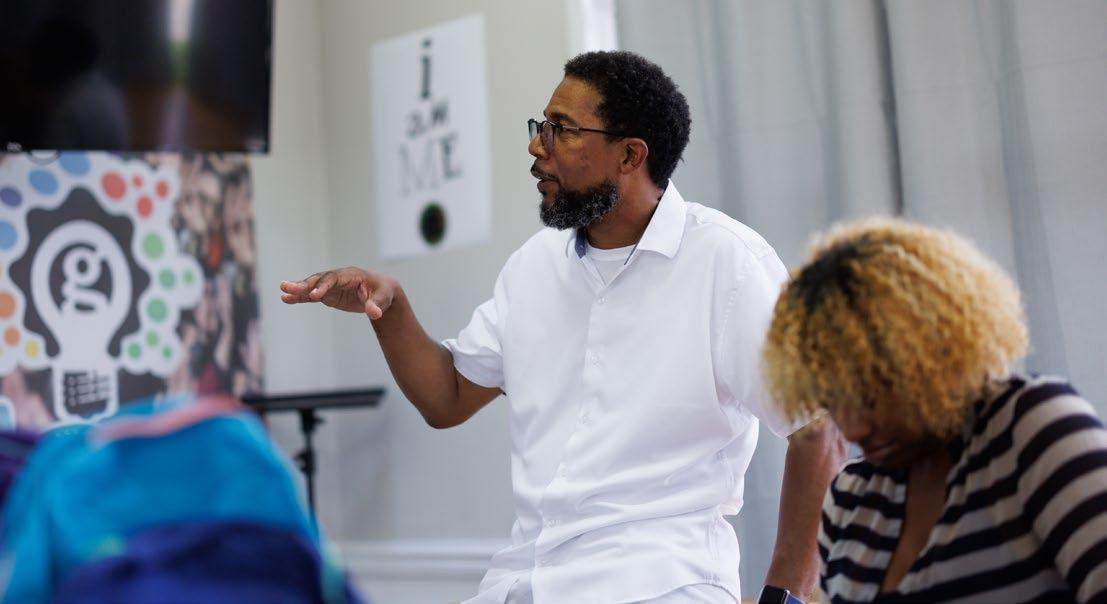
Kevin Brooks speaks with staff members and volunteers about the Gotcha' Back School Kickoff backpack giveaway.
In this “Back to School” issue, we at CityView prepare for the new school year while reflecting on school years past from many perspectives.
In our cover story, the Cumberland County Schools’ 2023-24 Principal, Assistant Principal, Teacher, and Beginning Teacher of the Year award winners reflect on their accolades and their call to education.
With public schools starting the first day of classes on Aug. 26, the winners get ready to pass on the baton to the 2024-25 “of the Year” honorees — the 18 finalists of the Principal and Assistant Principal of the Year, who share their thoughts on being finalists and their favorite memories in their role in this issue.
And, in preparation for the start of classes, the Gotcha’ Back School Kickoff returns on Aug. 17 with school supplies giveaways. We also bring you a profile of Kimmi Nettles, the scholarship manager of the Cumberland Community Foundation, who explains the importance of hyper-local scholarships for local students’ continued education.
To finish things off, we have a sponsored feature on Cape Fear Valley Health System’s Community Paramedic Program, and how it complements CFVHS’s services.
Column staples that you know and love return, as well as a special column from our publisher Kyle Villemain and a history column about Alexander Graham.
Want to know if we spotted you at an event? Check our Seen @ the Scenes! And fill your calendar with fun events from our To-Do List.
I hope you enjoy this issue. Thank you for reading!
You may have noticed some design changes in this issue. Tell us what you think!
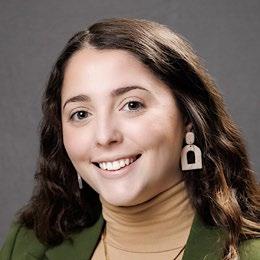
Valeria Cloës Magazine Editor vcloes@cityviewnc.com
Publisher Kyle Villemain
Magazine Editor Valeria Cloës
Editorial Assistants
Maydha Devarajan
Bill Horner III
Director of Operation & Sales Talmadge Rogers
Social Media Manager Raven Scott
Sales Team Leader Dawn Denham
Graphic Designer Annette Winter
Photographers
Oriana Evans
Aaliyah Lane
Sharilyn Wells
Tony Wooten
Contributing
Writers
Reggie Barton
Zachary Horner
Jami McLaughlin
Claire Mullen
Trey Nemec
Diane Parfitt
Teri Saylor
Aria Spears
Mary Zahran
Distribution
Jennifer Baker
Wayne Robinson
For advertising inquiries please contact sales@cityviewnc.com


AAt the start of June, CityView owner Tony Chavonne announced some news: The publication is transitioning to new ownership under The Assembly, a statewide outlet.
The Assembly is a three-year-old digital magazine that publishes long-form journalism on everything from politics to higher education to culture in our state. We’re also focused on supporting and growing reporting at the citylevel, which led to this new relationship with CityView
The Assembly’s approach is to find great journalists, give them space and time to dive deep into stories, and publish well-supported, nuanced, and compelling reporting.
Our guiding light for CityView is simple: Do more of what’s already working. And don’t be afraid to try new things.
Here are a few of our commitments and plans for the next six months:
1. We’ll strengthen the monthly CityView magazine.
a. We’ll commission more local columns and articles from current and new writers to make sure the magazine is filled with stories about the people and things that make Fayetteville what it is.
b. We’ll explore ways to increase our distribution — both the free copies around town and those that are mailed to subscribers — by printing more magazines for readers to enjoy.
c. And thanks to the longtime advertising support from so many local businesses, we’ve set a goal of increasing our magazine page count over the coming months to deliver an even more robust and interesting monthly magazine.
2 We’ll enlarge the Fayetteville-based news reporting team.
a. This month, we took our first step on this goal by adding a fantastic full-time reporter to the team covering health and healthcare. Morgan Casey started July 8, bringing CityView’s full-time editorial staff up to seven.
b. We’ll grow the pot of money used to pay freelance reporters so that we can commission more long-form investigative, feature, and enterprise work. CityView is already blessed with a great array of more than a dozen contributing writers and freelancers. We’ll commission more from this group and from other new writers as well.
c. We’ll keep doing daily news reporting and meeting coverage, but we’ll also look for ways to free up more reporter time for deep dives. We believe long-form reporting is what really impacts a city and tells readers something new.
3 We’ll spend money to grow our reach and readership.
a. We’ll create a marketing budget for CityView to tell more people — and new arrivals to the city — about ways to get CityView’s free news products, including
the magazine and the CityView Today newsletter.
b. For the advertisers who help underwrite our publication, that will mean more people seeing their message. For readers, it will mean more of their neighbors being informed and engaged in the city. We think that’s a win-win.
To do all this, we’ll add some resources from our statewide operation to CityView. We’ll also rely on local businesses and institutions to continue their historic support for CityView, and for new businesses to join them.
While The Assembly has a subscription-based model at the statewide level, CityView’s work, including its website and its newsletter, will remain free for anyone to access. But we’ll ask readers to consider joining CityView’s membership program by donating a few dollars a month to support our work.
We’ll also ask donors and supporters to keep supporting the 501(c)(3) News Fund, which Tony will continue to chair. The News Fund is governed by a fully independent board of Fayetteville leaders who know and love this city. Its support of CityView allows us to hire more reporters than otherwise possible to cover this city.
For the rest of 2024, CityView is expected to make just enough money to cover its projected expenses. We take that as a point of pride. We’re going to spend everything we’ve got on more journalism for Fayetteville and are so grateful for your help in making that number — and impact — as high as it can be.
Here’s how you can help in the months ahead:
• Send us story ideas, tips, and story feedback for the news operation. Email the editors, Bill Horner III and Maydha Devarajan, at bhorner@cityviewnc.com and mdevarajan@cityviewnc.com.
• Pitch us as a freelance reporter, either for the magazine or the news operation, by emailing talk@cityviewnc. com.
• Start a conversation about advertising packages and sponsorship. We’ll talk about how we can help you reach an audience and support our work. Email Talmadge Rogers at trogers@cityviewnc.com.
• Join our membership program, by giving a few dollars a month to support the news operation.
• Consider supporting in a larger way through a gift to the News Fund. Start a conversation by emailing info@ cityviewnewsfund.org.
Thanks for reading, and for helping make this possible. We’re excited about growing CityView over the years to come. Reach me anytime at kyle@theassemblync.com. With thanks,

Kyle Villemain Publisher kyle@theassemblync.com
EDITOR'S TAKE
BY BILL HORNER III
I’m not sure what compelled one of my high school teachers to say what she did nearly four decades ago, but I never forgot it.
Given what I’ve learned since, I’m trying to erase it from my mind.
Here’s what happened: Our class had been assigned to write a paper. A day or so after they were turned in and graded, Mrs. Alice King, my small Kansas high school’s legendary history instructor, stood in front of us with a frown and proceeded to scold us collectively for the horrible job we’d done. The papers were awful, she said, and the entire class would have to re-do the assignment.
All except for me.
Mrs. King singled out my paper, saying mine was the very example of what she was looking for when she gave the assignment. She then paused and asked the class: “What do you see Bill doing a lot of the time?”
Stone silence from my classmates. And embarrassment on my part as my heart seized up. I stared down at my desk, pencil in hand, where I’d been drawing cartoon figures in my notebook.
“Besides doodling,” she said.
The apparent secret to my paper, she said, was how much time I spent reading. Mrs. King spoke about how often she’d see me with my nose in a book. I would even occasionally be caught reading during her lectures. I had the ability to pay attention in class and successfully complete assignments, she reasoned, because I read so much. And reading — even during class — had to be the key to the quality of my paper.
It was at this point that Mrs. King declared: “Bill is the only person in this class who has my permission to do more than one thing at a time.”
So there you have it: I was awarded a hall pass to multitask.
What I didn’t realize then was that some of my reading (typically golf magazines hidden inside textbooks, or a Stephen King novel) and my doodling were boredom relievers, distractions from having to fully focus on a class
lecture. I could do that and still hear enough of the lecture to manage to get good grades.
For years afterward I thought of myself as a skilled multitasker.
I had permission, right?
I’ve learned, though, as I’ve grown older, that I’m not that talented. And that multitasking isn’t a real skill.
In adulthood, that distractibility has made it easy to try to juggle multiple tasks simultaneously. I’ve noticed it in others, too. We pat ourselves on the back for being so busy, for doing so many things at once.
But are we more effective? Are we doing all of those things well?
The short answer: no.
For the multitasker, apparently, effectiveness is an impossibility.
Proof can be found in the fact that the average American with a smartphone picks up the device around 150 times a day, according to Reviews.org — the main source, now, of our distraction. The dopamine addiction we get from a new email message, a “like” on a Facebook post or a text from a friend is powerful — so powerful, we know now, that we’ll be on the lookout for those things even as we’re engaged in another task, or other tasks.
I was particularly struck by this powerful lure a decade ago, when smartphones really began to be so prevalent. I spent a few days in Austin, Texas, at an international “mobile summit” for newspaper editors. One of the themes of the conference was the growing use of smartphones as tools for news consumption. Because there were a lot of techies and social platform X, formerly called Twitter, users at the conference, there was a whole lotta tweetin’ going on. It was fascinating for me to observe people watching presentations and tweeting about them at the same time. One speaker even live-tweeted as she presented.
It was then that I realized my people-watching, and scanning Twitter for updates to what I was watching in person, was a clear symptom of my own distractibility.
Studies have shown the brain can’t fully focus on more than one task at a time, so multitaskers are prone to error as the brain continually re-starts and re-focuses as they shift back and forth. Multitaskers suffer from memory problems, and research reveals that the more likely you are to consider yourself good at multitasking, the worse you are at it. Multitasking lowers your IQ and even changes your personality. A study at the University of Sussex used MRI brain scans to show that density in the area of the brain responsible for empathy and cognitive and emotional control is actually impaired among high multitaskers.
We think we’re getting away with it, but clearly we’re not.
Alas, contrary to Mrs. King’s claims, I’m not the exception.
I’ve used the “I have Mrs. King’s permission to do two things at once” line on my wife Lee Ann so often that she rolls her eyes when the words start coming out of my mouth. She knows me too well, and knows the truth: traction, or single-minded, dedicated focus, is a far better objective than distraction. Shifting focus to things that don’t matter is never a good plan.
The simple truth that drives our desire for distraction (with credit to “Indistractible” author Nir Eyal): multitasking is a bad habit born out of a yearning to distract ourselves with lower-stakes actions where we expect a more certain outcome. It beats being focused, which is the harder, and better, path.
That’s why I’m working on retiring my multitasking pass.
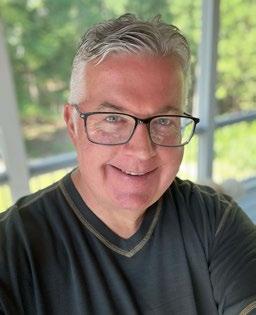












SOMEDAY YOU’LL THANK ME
BY MARY ZAHRAN
I have always had mixed feelings about August: I dislike it because it feels like the hottest and longest month of the year, but I also look forward to it because it signifies that fall — my favorite season — will soon arrive.
When I was a student, my mixed feelings extended far beyond the weather to include the academic world: The coming of August meant that summer vacation was almost over, but also that a new school year would soon begin, bringing with it new books to read and new subjects to explore.
The new school year I remember most vividly was in 1974, my first year at NC State. While I was excited by the prospect of learning many lessons in this new academic world, it was the world outside the classroom that would teach me the most important lessons in my first year.
As a small-town girl who had not traveled much beyond her home, I learned very quickly that the world was filled with an interesting assortment of people with vastly different backgrounds and experiences. My best teachers in this subject area were as different as two people could be.
My roommate, a girl from New Jersey named Dale, was my principal instructor. A friendly but somewhat brash person, Dale introduced me to the f-word, something I had only heard in one R-rated movie. I had been taught not to use profanity, so you can imagine what kind of experience it was for me to listen to Dale talk.
Perhaps the most interesting lesson Dale taught me was that not everyone comes from a home where parents have conventional occupations. When Dale told me her mother was a telephone psychic, I thought she was kidding, but she wasn’t. Coming from a long line of farmers, brick masons, and dry cleaners, I was used to seeing people come home covered in sweat and dirt. I couldn’t picture my father or grandfather sitting at a telephone all day, reading tea leaves or tarot cards to strangers.
When Dale wasn’t regaling me with stories of her life in New Jersey, I was listening to the confessions of a boy named Ricky, a freshman living in the dorm next to mine, who was extremely homesick. Ricky managed to stay through the first semester, but he didn’t return in
January. I learned later that he was overwhelmed by the size of the campus, which was larger than his hometown. Unlike Dale, Ricky didn’t have the ability to adapt to new places.
Unlike Ricky, I was excited to be on a large campus with new places to explore. My only problem was that my sense of direction, or lack thereof, frequently led me astray. During orientation week, I had to take a placement test for French, and the building I needed to go to was across campus from my dorm. Naturally, I went to the wrong building, and when I found the right building, the testing sessions were finished. I ended up in French 101, a class that actually turned out to be a wonderful experience. The instructor was delightful, and I aced every test because I had already completed three years of French in high school.
My most enduring lesson in my first year involved a curtain and a sudden change in the weather. I was in a “Living and Learning” program that required its members to attend a workshop in late September. When we boarded the bus to go to our weekend retreat, the temperature was about 80 degrees. The next morning, when we woke up, the temperature was about 40 degrees. I hadn’t packed a sweater, so I had to improvise to keep from shivering. Like “Gone with the Wind’s” Scarlett O’Hara, I found my answer in a window. I grabbed the curtain in the window next to my bed, wrapped it around my shoulders, and wore it to breakfast, proudly showing off my survival skills. Decades later, I remember this experience and always pack a sweater when I travel.
Say what you want about the virtues of studying quantum physics, civil engineering, or medicine: My appreciation of the nearly infinite varieties of human experience, coupled with the wisdom of always packing a sweater, have been two of the most valuable lessons I learned in college.

Mary Zahran, whose sense of direction has only grown worse with age, can be reached at maryzahran@gmail.com.


BY CLAIRE MULLEN
It’s back-to-school time, and in our town, especially, being the “new kid” is, well, nothing new.
As families come and go along the military highway, it’s very commonplace for the halls of our schools to be graced with lots of unfamiliar faces at the beginning of each year, and if you’re like me and have ever been the “new kid,” you know that it ain’t exactly easy.
I left the middle school with which I was familiar, and a passel of friends and classmates I’d known since kindergarten to attend a new school for 7th grade. The only thing more trying than being a middle-school girl in general is being a middle-school girl with coke bottle glasses and unfortunate bangs who knows almost no one at her new school.
Needless to say, I was a ball of nerves on that first day of school morning in 1998. I vividly remember angsting over my outfit before finally selecting a Limited Too T-shirt emblazoned with a huge sunflower, purple denim shorts, white scrunch socks, and Adidas Ozweego sneakers. There was another seemingly minor detail of my morning’s preparations that day that has stayed with me all these years because of the role it would ultimately play in helping cure my new kid jitters — I tucked a sheet of Mr. Bubble stickers (a silly free promotional item that had come attached to the back of a bottle of bubble bath) into my Trapper Keeper.
After my mom dropped me at the entrance of my new school, I made my way to the middle-school hallway and double-checked my schedule to find the number of my homeroom. As I entered the classroom, I found that many students had already settled in and taken their seats. I can still see the layout of that classroom in my mind.
I made a beeline for the first empty desk I could reach, in the back row of the room closest to the door, and opposite from the crowd of girls who had gathered together in a cluster of desks at the front. They were chatting and giggling amongst themselves, waiting for class to begin. I remember not knowing what to do, and killing time by making myself look busy with unloading and organizing my school supplies. I remember opening my Trapper Keeper and mindlessly shuffling around the looseleaf paper that was inside.
As I lined No. 2 pencils up on my desk, slowly wrote my
name on my notebook, and looped my backpack straps on the back of my chair, I watched the gang of girls out of the corner of my eye. I imagined they were probably talking about their summers, catching up on life since they’d last seen each other in May. I remember feeling a pit in my stomach and missing my own girl gang who was probably currently doing the exact same thing at my old school.
And then, one of those girls in the front row stood up and walked toward the back of the class, I assumed maybe to sharpen her pencil or toss something in the wastebasket. But no, she came straight for me. I’ll never forget the moment that the first person at my new school talked to me and exactly, verbatim, what she said. She looked down at my desk, and the open Trapper Keeper with the sheet of Mr. Bubble stickers on top and said, “Hey! I’m Meredith. Those are pretty cool stickers. You can hang out with us if you want to.”
Just like that, the “new kid” feeling that felt a lot like a bad stomach ache began to dissipate. It only took one person making one kind gesture — that to her was probably not much of anything at all — to change the course of my first day as the new kid in a new place in a really big way and also to teach me a life lesson that I still carry with me to this day.
It turned out that I would come to love my new school and be welcomed into a mix of kind souls who would become lifelong friends. I have told my children the “pretty cool stickers” story enough times that they now moan, “Moooom, we already know this one!”, but I tell it to them in hopes that it might inspire them to be the ones willing to reach out to the new kids who they will inevitably encounter along the way.
I would like to send good vibes and great wishes to anyone who is entering this school year as the “new kid.” It’s going to be just fine if the Meredith Boyettes’ of the world have anything to do with it.

Claire Mullen, who has had LASIK eye surgery and grown out her bangs, can be reached at clairejlmullen@ gmail.com
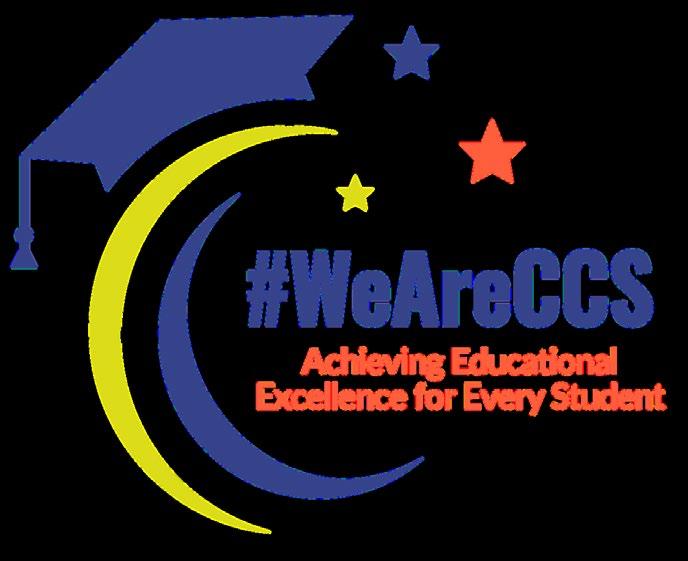
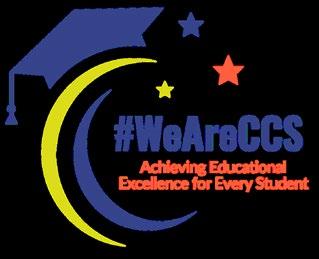
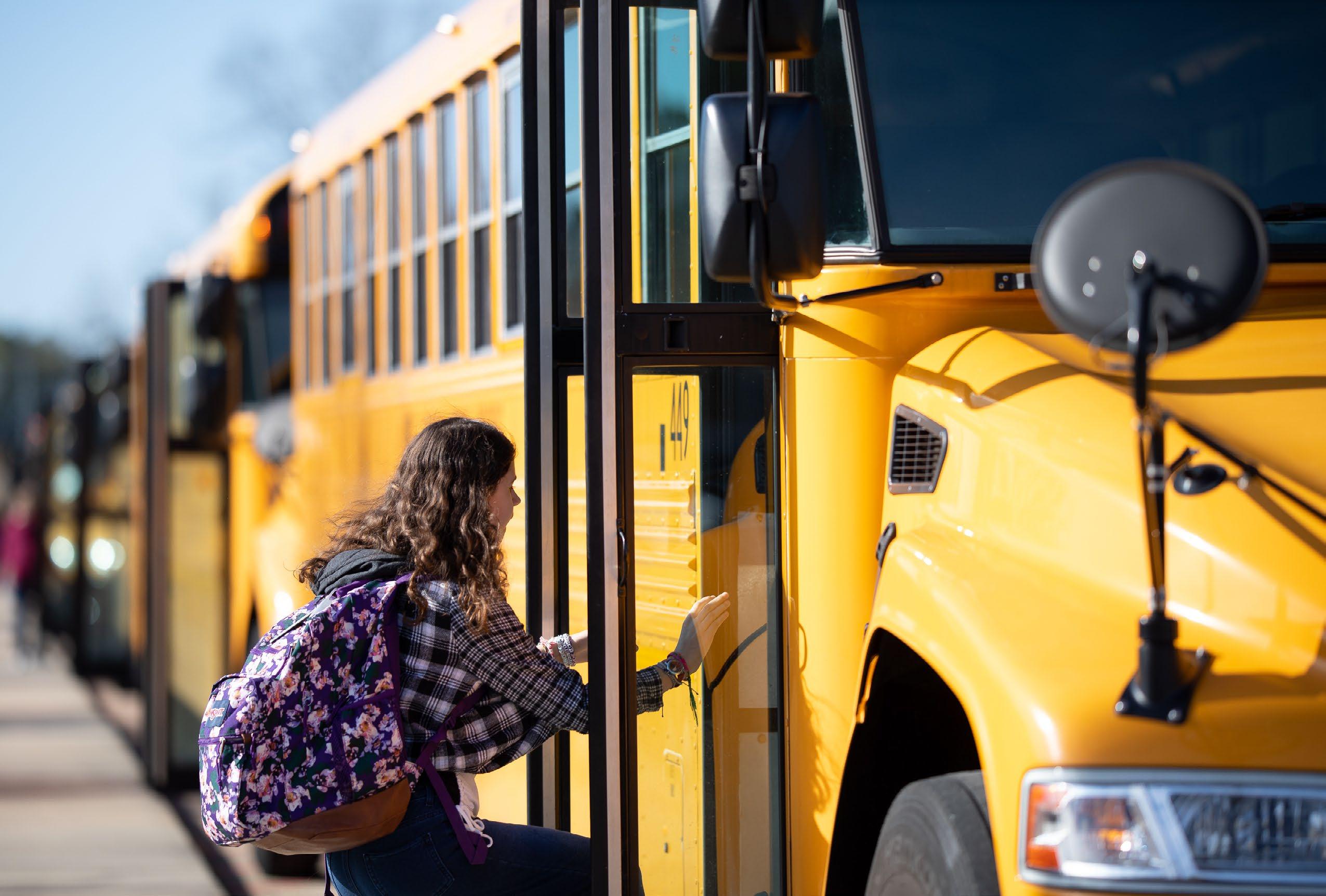






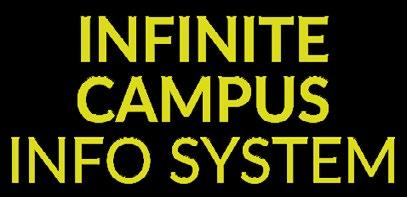
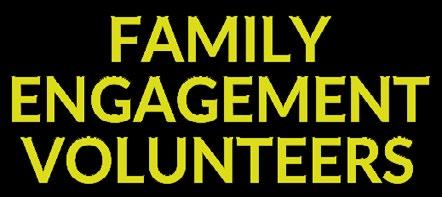


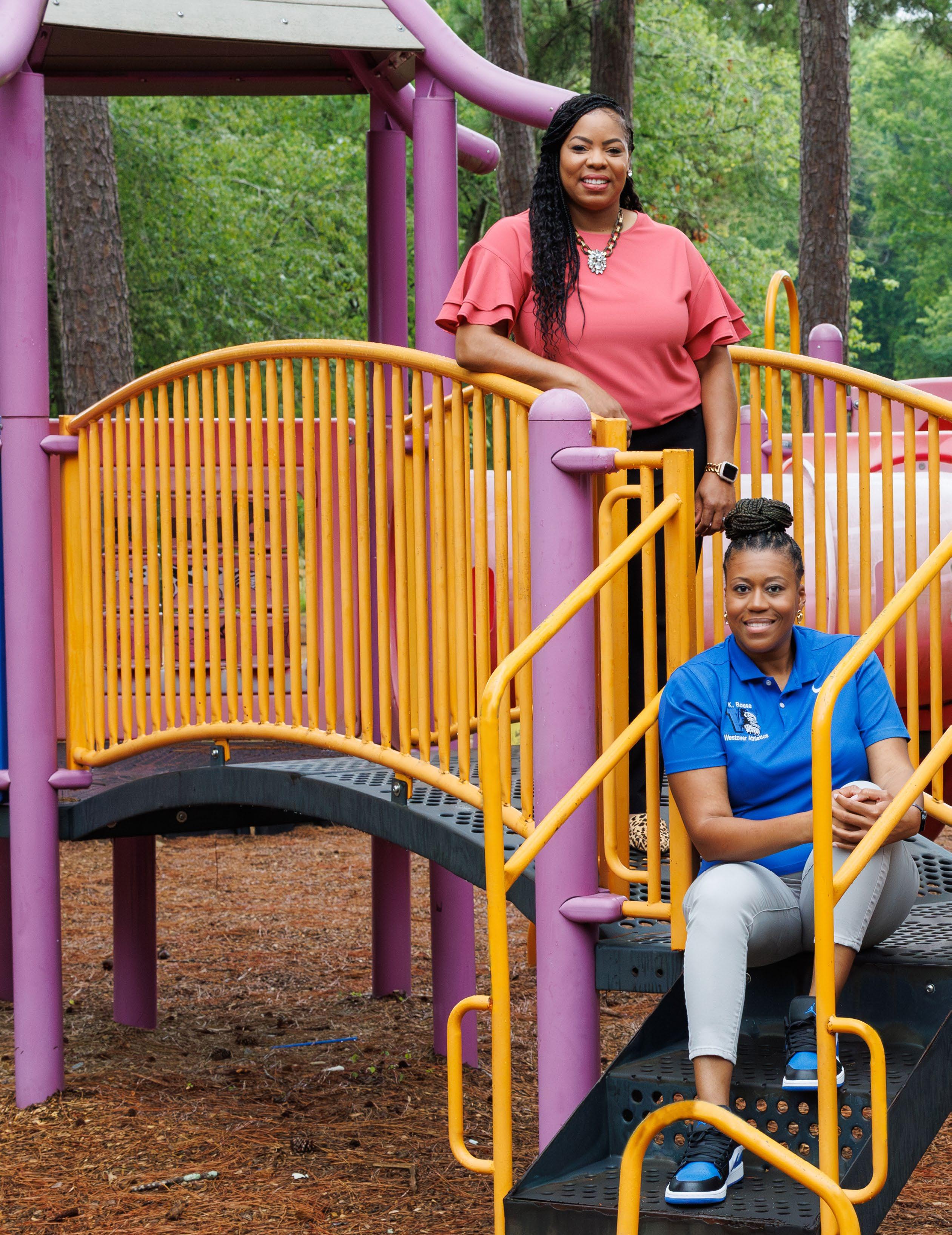
Erica Fenner-McAdoo of Howard Hall Elementary School, Kristle Rouse from Westover High School, Sade’ Mangum from Seventy-First High School, and Steven Barbour of Terry Sanford High School at Mazarick Park.
Cumberland County Schools’ ‘of the Year’ honorees talk student engagement, staying refreshed
BY ZACHARY HORNER
PHOTOGRAPHY BY TONY WOOTEN
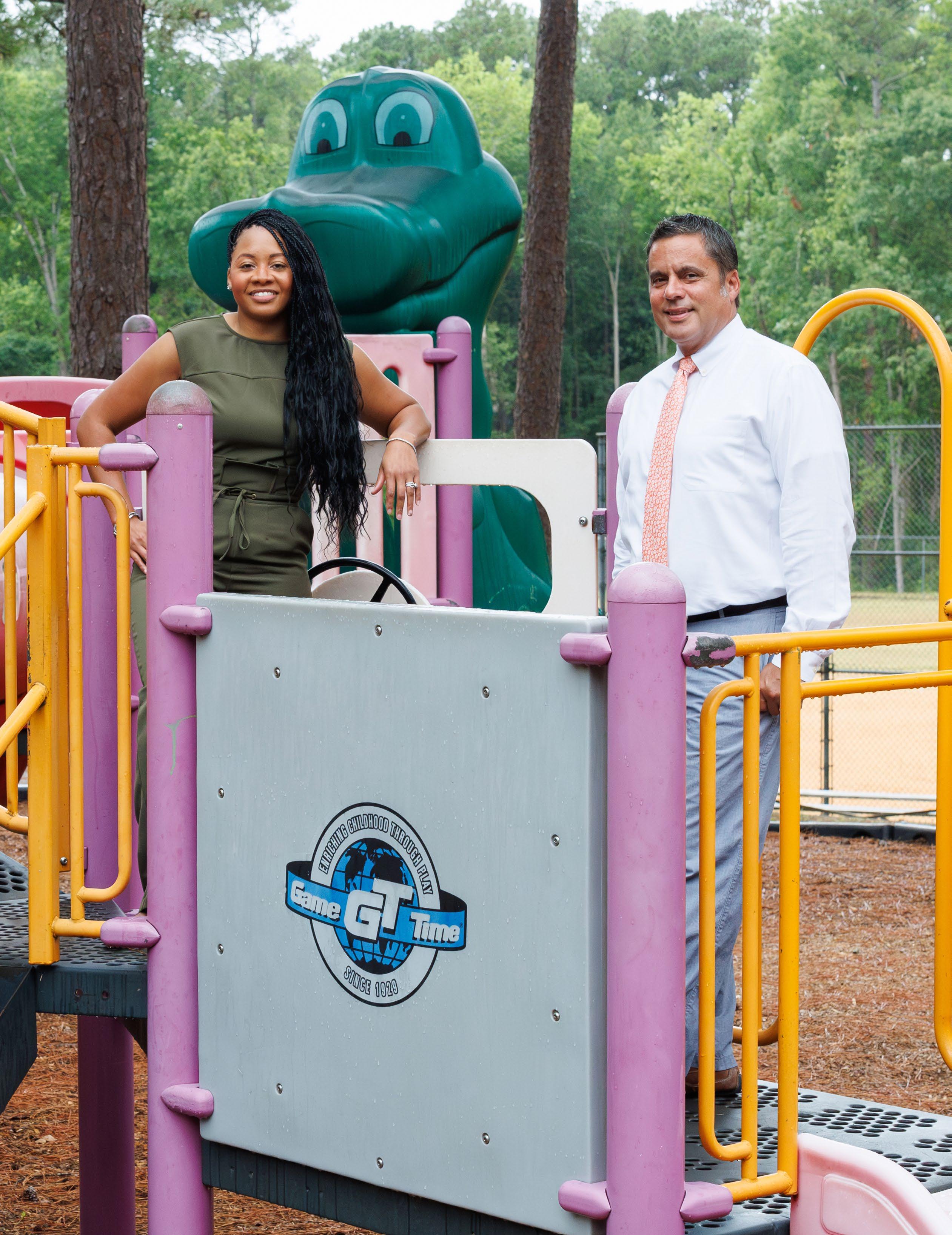
BBy most measures, it’s safe to say that educators — particularly at the primary and secondary levels — have very difficult jobs.
Look at any job opening for a teacher and you will find, no matter the school system or grade level or subject, the requirements list is usually extensive. And that list usually doesn’t detail the day-to-day responsibilities, the difficult phone calls with parents, the challenges adjusting to new requirements and laws, and the varied backgrounds and personalities that enter their classrooms or schools every day.
Each year, Cumberland County Schools recognized four individuals for their work in and around the classrooms of the county: Steven Barbour of Terry Sanford High School, Erica Fenner-McAdoo of Howard Hall Elementary School, Kristle Rouse from Westover High School and Sade’ Mangum from Seventy-First High School. These four were cited by their peers as the “best of” for 2023-24, earning Teacher, Principal, Assistant Principal, and Beginning Teacher of the Year respectively.
In a statement spotlighting the honors, CCS Superintendent Dr. Marvin Connelly Jr. stated that the winners “highlight how our teachers and administrators are skilled, caring, dedicated and united for student success.” By honoring these four, the district says these individuals are not just meeting the requirements of their jobs but going above and beyond and rewarding them for it.
Principal of the Year from Howard Hall Elementary in Fayetteville. She referenced her kindergarten teacher Mr. Jordan, who “loved me” and “made school fun.” But even before then, Fenner-McAdoo says, the teaching bug had bit. Her mother helped her turn a backyard playhouse into a classroom for baby dolls with discarded textbooks when she was 8 years old.
“In my mind, I was a teacher, and as I grew up, I never lost that passion,” she said. “I wanted to be a ‘Ms. Jordan’ in the life of a student one day.”
Featured as the WRAL News Teacher of the Week in midDecember 2023, Mangum is also a CCS alum, graduating from the same school at which she now teaches. In 2021, she started working as the junior varsity cheerleading coach at Seventy-First. During that time, she says, she developed a desire to be more involved in her charges’ academic careers.
“I wanted to be closer to my students and support them both on and off the field,” she said. “Once I took on the role of an educator, I quickly realized the profound impact I could have, not just on student athletes but on all students. Witnessing their growth, guiding them through challenges, and celebrating their successes has been incredibly fulfilling.”
Similar to Fenner-McAdoo, Rouse’s education career started early. She also played school growing up, enlisting her younger sister and teddy bears to sit under her tutelage.
I believe in the mission of public education. I believe it’s essential for democracy. On a personal level, I enjoy being a part of young people’s personal growth.
— Steven Barbour
Barbour, a history teacher at Terry Sanford High, was no stranger to Cumberland County when he first came to the district to teach in 2000. He’s an alumnus of South View High School in Hope Mills, and in a district video earlier this year, cited his old AP U.S. history teacher at South View as his inspiration for getting into teaching. Twentyfour years later, he was honored as the top teacher in that same district.
“I believe in the mission of public education,” he said. “I believe it’s essential for democracy. On a personal level, I enjoy being a part of young people’s personal growth.”
It’s that same process — helping young people grow and succeed — and that same type of personnel (a former teacher) that inspired Fenner-McAdoo, the district’s
After starting as a science teacher in the district in 2013, she became assistant principal at Westover High in 2020.
“Education has always been an option for me,” Rouse said. “Even though we may have tough days, my ‘why’ is always the students. I show up every day because they do, for some of our students, we are their constant.”
Each of these four educators, when speaking about why they got into education, referenced “students.” Students are the purpose, they say, the ones who are the recipients of all the work educators do.
Challenges with students are becoming one of the most significant sources of stress for teachers nationwide. In a 2024 nationally representative survey from the


nonprofit public policy group RAND Corporation, 45% of all teachers said “managing student behavior” was a source of job-related stress, top on the list. Additional sources of stress included supporting learning lost due to the Covid-19 pandemic and supporting students’ mental health and well-being. Despite these stressors, and reported well-being worse than that of similar working adults, teachers who answered the survey were “as likely to say that they intend to leave their jobs as similar working adults.”
Put simply, Mangum and her colleagues want their students to grow; they say engaging these students is the key to making education successful. The reigning Beginning Teacher of the Year said she works to try to create “a dynamic and inclusive learning environment” in order to “motivate and inspire students to stay excited about their education.”
“To keep students engaged, I make lessons relevant to their lives, incorporate hands-on activities, and use interactive projects,” she said. “Differentiated instruction ensures that all students can access the content, and building strong relationships fosters a supportive classroom community. Additionally, utilizing technology and multimedia resources adds an interactive dimension to lessons.”
Fenner-McAdoo cited the late educator Rita Pierson, who said in a 2013 TED Talk that “children don’t learn from people they don’t like.” Fenner-McAdoo encourages teachers at her school and helps establish programs at Howard Hall Elementary to try to build relationships with students to engage them in learning.
“The first key to student engagement is building relationships,” she said. “This goes back to my education philosophy about leading and teaching with heart. … Students must trust their teacher and know he or she has their best interest at heart. Building the relationship is half the battle sometimes.”




Class begins August 19; ends October 17. Tuition
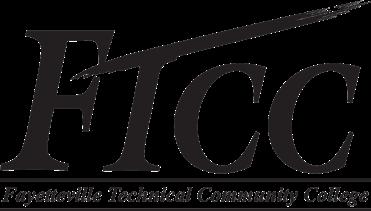


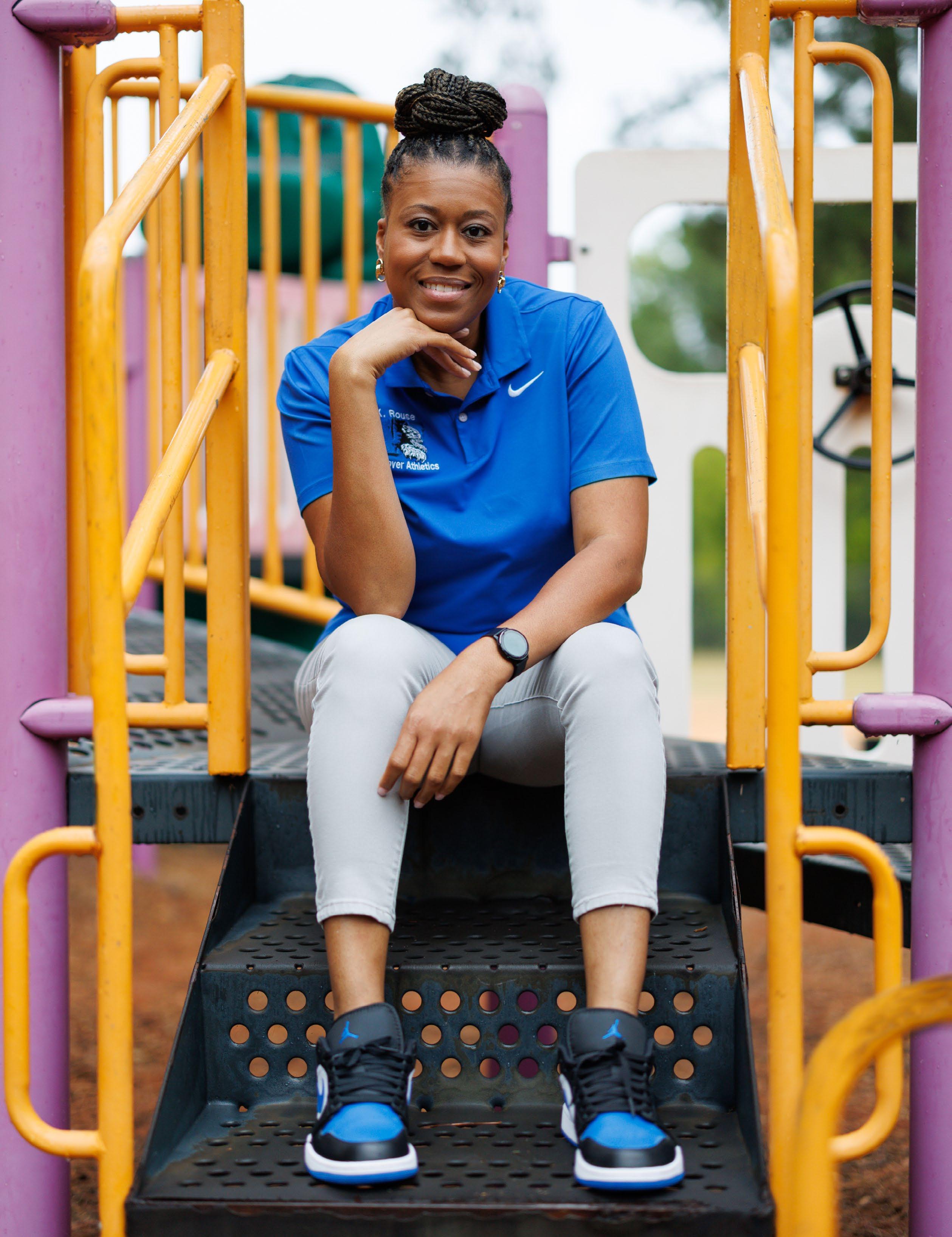
Rouse turns also to a quote, this one from author and leadership guru John C. Maxwell: “Students don’t care what you know until they know that you care.”
“Students do not learn from … people they feel do not care about their overall well-being,” she said, adding that “building and maintaining relationships” with students is the key to keeping those students engaged in the educational process.
Barbour cites numerous factors that keep students engaged, including a “supportive family structure, highly qualified teachers, properly funded schools and relevant lessons.” In his Teacher of the Year nomination portfolio, Barbour also cited the importance of connecting with students.
“Students need to feel personally invested in their learning to be successful,” he wrote. “Building meaningful relationships with students is an important component of that investment — empowerment is the other.”
The RAND survey found that almost twice as many teachers had “frequent job-related stress or burnout” compared to similar working adults, and around three times as many educators “reported difficulty coping” with that kind of stress.
So how do these educators cope? Fenner-McAdoo cited community outside the school, including her family and her church, as a critical piece of decompressing and recharging.
“I love spending time with my family,” she said. “I unplug and live in the moment with them. Time is one thing we can not get back. Being intentional about listening, laughing, and loving on them is always my target.”
Rouse also referenced church “because it helps keep me grounded and centered on my purpose,” and added that reading “helps stimulate


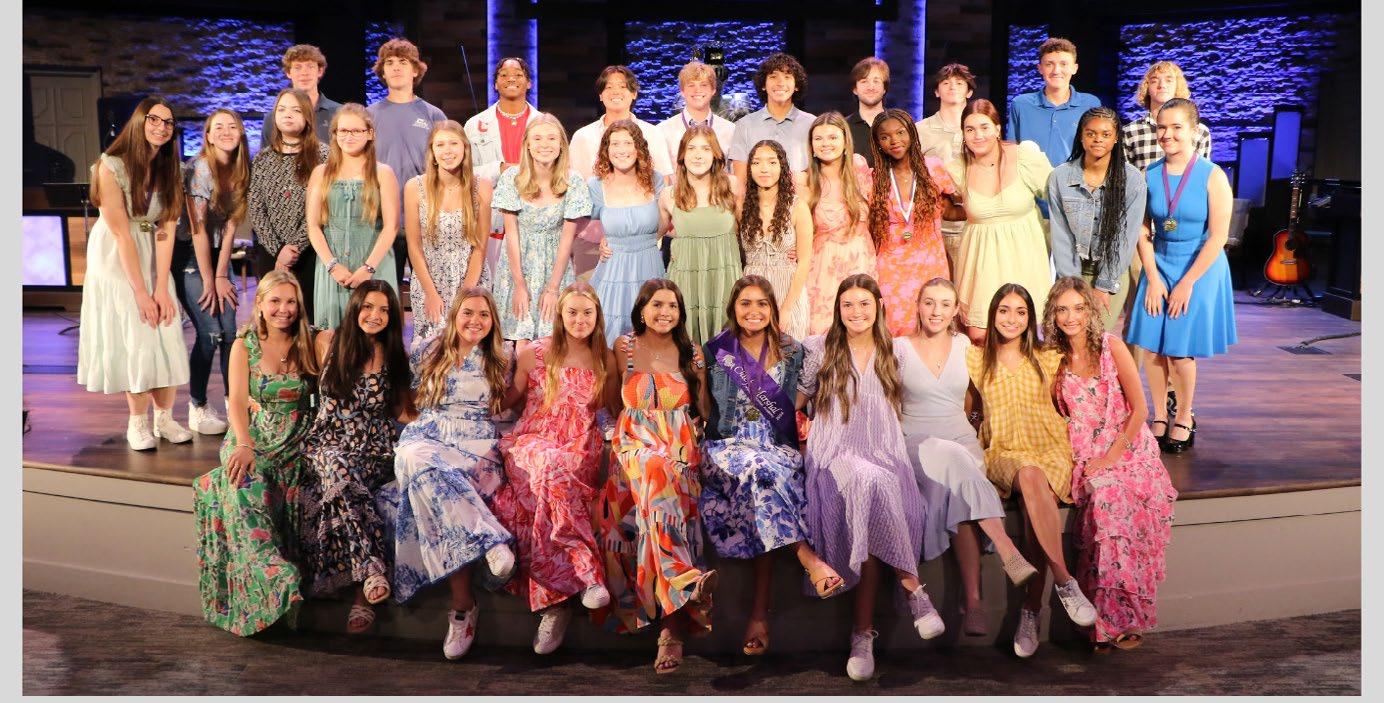

my mind and allows for continued growth.” Traveling is also helpful for her. Barbour spends time outside, coaching the boys and girls soccer teams at Terry Sanford, exercising, and cycling while also prioritizing family time. Mangum also says family time is critical, along with trips to the spa.
“These activities help me unwind and maintain a healthy work-life balance,” she said. “They rejuvenate me and provide a mental break, allowing me to return to the classroom refreshed and energized.”
As we welcome August and classrooms prepare to open back up for the 2024-25 school year, each of these four individuals — along with the more than 3,000 teachers across Cumberland County Schools — will return to their purpose, taking the summertime refresh and going back to the grind.
After all, there are students who need to learn, students who have an opportunity to grow.
“Ultimately, education is very existential in nature,” Barbour said. “Education is a tool for a person [to] maximize their human potential and develop their identity.”
Rouse adds: “As educators, we are there to help guide children into the next levels and phases of their lives. So, my goal is to equip my students with the skills necessary to move to the next phase in their lives.”
Zachary Horner is a contributing writer for CityView Magazine. Horner holds a bachelor's in journalism from Elon University and will graduate from the University of Kentucky in December with a master's of social work. He and his family live in nearby Lee County.

As summer sizzles on, PWC reminds you to take extra care to save power and water. Follow these tips to lower your bills!
• Conserve power during Summer Peak Hours (3-7 p.m. weekdays). Do laundry, run the dishwasher, etc. during Off-Peak Hours when electric rates are 35% lower.
• Keep your A/C set at 78° (higher when you’re not home). A programmable thermostat will help.
• Use fans and close blinds/curtains to keep the sun out.
• Service your cooling system and change filters monthly.
• Follow the Odd-Even schedule for watering with automatic/unattended sprinklers (only water when you need to). Install a rain sensor on your sprinkler system to avoid watering on rainy days.

• Check for/fix leaks in hoses and faucets. Be sure you always turn them all the way off.
Scan the QR code to visit www.FayPWC.com/EnergyConservation-Tips/ and find more conservation tips to help you save this year during the Dog Days of Summer!

Cumberland County Schools’ Principal and Assistant Principal of the Year finalists
share what it means to be considered among the best in the public school system.
BY VALERIA CLOËS
IIn June, Cumberland County Schools released a list of the 18 principals and assistant principals who are finalists for the “2025 Principal of the Year” and “2025 Assistant Principal of the Year” honors, respectively.
When asked what being a finalist means to them, many said it is an honor and a privilege, feeling grateful to be recognized by their colleagues who selected them for this distinction.
Most acknowledged their peers and supporters as crucial parts of their journey, and are humbled to be a part of an outstanding group of finalists. This recognition has given many motivation to persevere and continue to positively impact the community.
The school system will be holding a special event this fall to announce and honor the winners.
Meet the finalists and find out what their special memories are from being in their role.
To take a peek at the 2025 Teacher of the Year finalists and for additional information on the POY and APOY finalists, scan the QR code to access the digital version of this story.
Responses are excerpted below and have been edited for brevity and clarity.
Principals

Benjamin Martin Elementary School: Corine O.
B. Warren
Tell us about a special memory from your career you have of being principal.
Our school was recognized for its growth and development one and a half years after I began my role. I started my principalship on Jan. 6, 2020, six weeks before schools became virtual (and eventually remote) due to the Covid-19 pandemic. Despite our unprecedented challenges, our dedicated staff and students worked
tirelessly, and their efforts paid off extraordinarily. I received the thrilling news that our school had exceeded state expectations, which it previously did not meet. I gathered my school family members for a meeting, and with immense pride and exhilaration, I shouted about our accomplishment. Although I always strive to be transparent with my school family, they’d never heard me express such a burst of emotion. I was elated for them to see the fruits of their labor.

Mary McArthur Elementary School: Lisa Gillespie
Tell us about a special memory from your career you have of being principal.
A special memory is having my daughter, Ivery attend Mary McArthur Elementary School with me for two years. Having her as a student allowed me to experience the greatness of our school as both a parent and an educator.

J.W. Seabrook Elementary School: Antoine McGill
Tell us about a special memory from your career you have of being principal.
Educators are known for their ability to monitor and adjust; particularly when it comes to classroom instruction. Covid-19 presented many challenges for public education as we have typically known it. However, this period definitely holds a special memory for me. Watching teachers change everything they know about teaching in order to still reach children was amazing. In the midst of the pandemic, teachers and public schools were truly seen as not only heroes but an essential part of our community.
As I walked through the familiar halls where I once studied, where my father had roamed decades before, and where my grandfather first embarked on his educational journey, a profound sense of continuity and legacy washed over me.
— Larry Parker Jr.

W.T. Brown Elementary School: Dr. Shanessa Fenner
Tell us about a special memory from your career you have of being principal.
I drove up to the McDonald’s drive-thru window and one of my former students was working there. She saw me and said, “Dr. Fenner, I am in college like you told us to do every day on the morning announcements.” I laughed so hard, but she was absolutely correct. It felt good to know that she was listening and took heed to what I was saying. It is an absolute privilege to have a positive influence on the lives of our future generation.
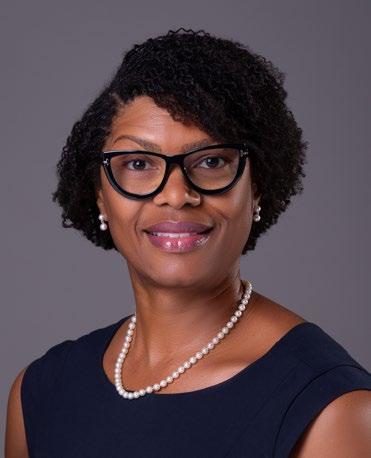
Sherwood Park Elementary School: Shannon T. Booth
Tell us about a special memory from your career you have of being principal.
One of the most special memories of my career as a principal was implementing a mentoring program that truly made a difference in our students’ lives. Witnessing firsthand the transformation as students gained confidence, set ambitious goals, and surpassed their own expectations was incredibly moving.

Westover Middle School: Dr. Natasha Brown
Tell us about a special memory from your career you have of being principal.
A particularly memorable moment was when our school received national recognition as a “Model School 2024.” I had the privilege of sharing my journey
as a principal and the incredible achievements at our school with educators from across the U.S. It was inspiring to see how my story of leading our school through a pandemic, achieving high growth levels, and managing high teacher turnover as a fairly new principal motivated others in what is often called a thankless profession. This experience reaffirmed the power of resilience and dedication, inspiring fellow educators to return to their schools with renewed enthusiasm and commitment.
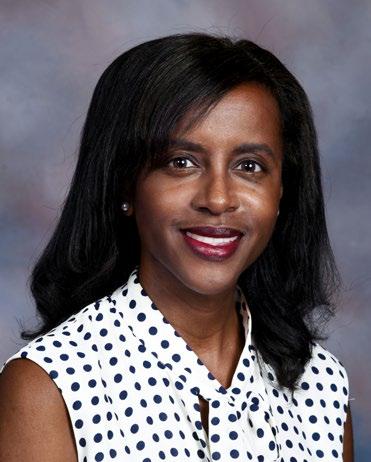
Tell us about a special memory from your career you have of being principal.
As a principal, the Covid-19 lockdown was a time of perseverance and creativity. It also highlighted the relationships our students have with schools and school leaders. There were days spent delivering snacks and books to the front porches of families in need that lacked transportation. There were lighthearted moments while “visiting” virtual kindergarten classrooms full of excited learners, stuffed animals, and sometimes pets. I relish the memories of students in grades 3-5 who would log into my virtual office to “have lunch with Ms. B.” The fact that they chose to spend time with me demonstrated the bonds I formed with our school families. The lockdown period reignited my passion as an educator and this is how I choose to remember this time in our history.

E.E. Smith High School: Larry Parker Jr.
Tell us about a special memory from your career you have of being principal.
Becoming the principal of E.E. Smith High School was more than a professional milestone; it was a profound chapter in the story of generations. The day I assumed the role of principal was a culmination of years of dedication, not just to my career, but to the community that shaped me. As I walked through the familiar halls where I once studied, where my father had roamed decades before, and where my grandfather first embarked on his educational journey, a profound sense of continuity and legacy washed over me. To be entrusted with the stewardship of a school deeply woven into the fabric of my family’s history was both humbling and exhilarating. It was a day etched with pride, gratitude, and a deep sense of connection to a school that will forever hold a special place in my heart.

Massey Hill Classical High School: Dr. Douglas Massengill Jr.
Tell us about a special memory from your career you have of being principal.
At Massey Hill Classical High School, I am privileged to know all of my students and many of my families well. After becoming principal of the school at the beginning of the 2022-23 school year, I had the responsibility of being the new principal and reinstating policies that had been suspended during Covid-19. As you can imagine, many of these items were not popular with students, but were necessary to ensure continued student safety and a return to high academic expectations. I vividly remember one student who was very unpleased with me and they made that displeasure known at a junior class meeting. Fast forward two years and after lots of conversations and relationship building, the biggest hug I received post-graduation was from that same student.
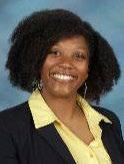
William H. Owen Elementary School: Constance Thomas
Tell us about a special memory from your career you have of being assistant principal.
One of my most memorable moments in my career as an assistant principal was creating a remediation/tutoring program that accelerated our scholars’ learning in grades 3-5. The planning process was implemented by collaborating with teachers and the leadership team to ensure all scholars’ needs were being met with equity in mind. The timeline for this plan was for 90 days to assist in increasing student proficiency and closing the gaps. At the end of the school year we saw tremendous growth and an increase in proficiency of our scholars.
By the end of the school year, her teacher was highlighting how she was a different student from the beginning of the year and her mother was pleased with the changes she saw in her child. — Dr. Hope Littlejohn

Westarea Elementary School: Jernise Flood Rucker
Tell us about a special memory from your career you have of being assistant principal.
Some of my most precious memories have been created with students. Having the opportunity to see them grow into young adults is very rewarding. I specifically remember a few of my previous students coming back to visit and sharing stories of how our school helped them along their journey. Students and their education is top priority for me and I look forward to creating many more special memories in the future!

Ed V. Baldwin Elementary School: Dr. Hope Littlejohn
Tell us about a special memory from your career you have of being assistant principal.
A special memory of mine as an assistant principal is when I became the assistant principal at a new school and I learned about a young lady that I was told was going to give me a hard time. I knew that I wanted to reiterate a positive school culture and positively impact students. Therefore, when I had the opportunity to meet this student, and many others like her, I wanted them to know that I was on their side and I was going to motivate them and uplift them throughout the school year. When this student came to me on the first day of school after she had disrespected her classmates and teacher, I knew I would form an immediate relationship and ensure that I was her personal cheerleader. By the end of the school year, her teacher was highlighting how she was a different student from the beginning of the year and her mother was pleased with the changes she saw in her child. If I could have a success story like this with every student that I encounter then I have accomplished my favorite aspect of my job.

Walker-Spivey Elementary School: Latonica McDonald
Tell us about a special memory from your career you have of being assistant principal.
One special memory that I hold close to my heart is my work with the Positive Behavioral Interventions and Supports (PBIS) Initiative over the past two years. As the Chairperson of PBIS, I noticed that teachers were concerned about student behavior and how it was disrupting learning in the classroom.
To address these concerns, I collaborated with the

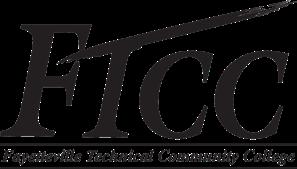




...I realized being a leader is not about self; it is about building the capacity of others around you.
— Teresa Rubio
teachers on the PBIS team and reached out to colleagues at other schools for ideas. This led to the creation of Club Day. Once each quarter, students could choose to attend a club of their interest. We organized clubs such as Chess, Canvas Painting, Brain Teasers, and Karaoke, to name a few.
Students were thrilled about Club Day and worked hard to improve their behavior to earn the reward of participating. As a result, we saw a significant decrease in behavioral issues and an increase in student success. The initiative not only engaged students but also provided them with a fun and creative outlet.
Teachers, students, and families all benefited from this new approach.
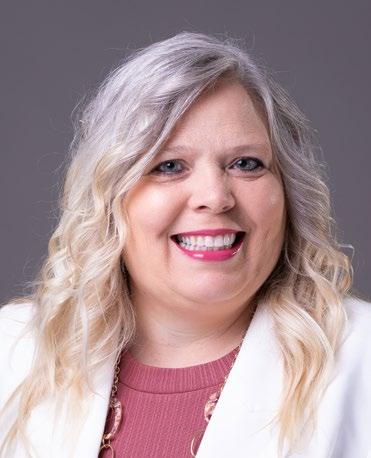
Teresa
Rubio
Tell us about a special memory from your career you have of being assistant principal.
A special memory I have is when Mrs. Ray, a retired principal, encouraged me to go forth to achieve my career goals. It was during this moment that I realized being a leader is not about self; it is about building the capacity of others around you. Education is not done alone, it is not a competition, it is not who knows more, it is pulling together to ensure the best for all students. It is about every special moment when students see you many years later with their stories of accomplishments.

South View Middle School:
Eddie Ford IV
Tell us about a special memory from your career you have of being assistant principal.
This school year, a student in the 8th grade did not have a father figure in his life and his mother asked if I could be a mentor for her son. His mother’s main concern was her son making good choices. I gave her my word and I checked on him once a week for his grades and behavior. Toward the end of the school year, he was nervous about his EOG test. I spoke to his teachers about ensuring he had tutoring during school and after. He ended up passing his EOG test. This was truly a defining moment for the student. This will always be a special memory for me.

Elan Goodman-Robinson
Tell us about a special memory from your career you have of being assistant principal.
One of the greatest memories by far has been surprising a former student at his high school graduation. When greeting this young man at his graduation, he smiled and we cried. He told his family that it was I who continuously encouraged him (even after he no longer attended my school) to do great things when life was pulling him in different directions. This moment will forever be engraved in my memory.
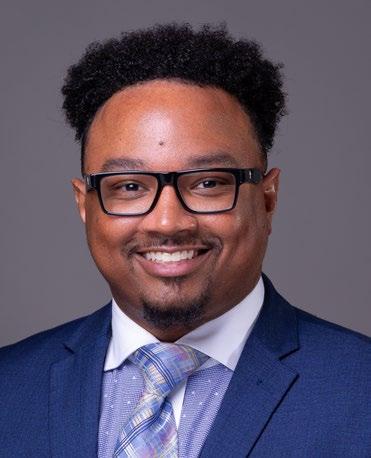
Tell us about a special memory from your career you have of being assistant principal.
One special memory from my career was the first home football game after being hired as the assistant principal at Pine Forest High School in 2021. This game took place the week before school started and really solidified the idea of me being a part of this amazing leadership team led by the awesome principal, Dr. Juelle McDonald. That night, it really hit me that I was no longer a teacher and that I was considered a leader, and people saw me in that light. It was a memorable experience to see how we, as a team, jumped in together to work that night amidst the craziness of Covid-19 and with students and families being able to gather together again. In so many words, “I found my tribe” through my work, and it was amongst leaders who pushed and are continuously pushing me.
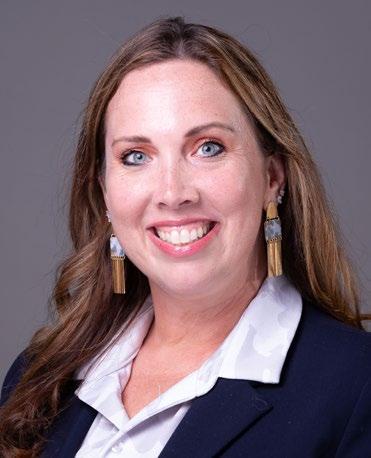
Tell us about a special memory from your career you have of being assistant principal.
Of course, all classes are special but there is always something special about your first class. I began as an assistant principal in 2014 and one of my favorite days was when the class of 2018 graduated. There were so many stories with that class and I felt like we “grew up” together. I was blessed to be able to watch their full high school experience. It has been great to see and hear from so many of those students (and all of our students) after they graduate and learn more about their lives and how their experiences and relationships at E. E. Smith made them who they are today.






Please
at mail@macraewhitley.com
The family-owned businesses featured on these pages reflect years of hard work, integrity, and vision, all while steeling themselves against the possibility of failure.
Businesses like these have an immeasurable positive impact on our community. They are a reflection of our city’s history, and they enrich all of us who live here. Our community would not be the same without them. We salute each of these businesses and wish them continued success for generations to come.
We will be profiling young professionals in our September issue. Call CityView at 910-423-6500 or email sales@cityviewnc.com to reserve your spot.
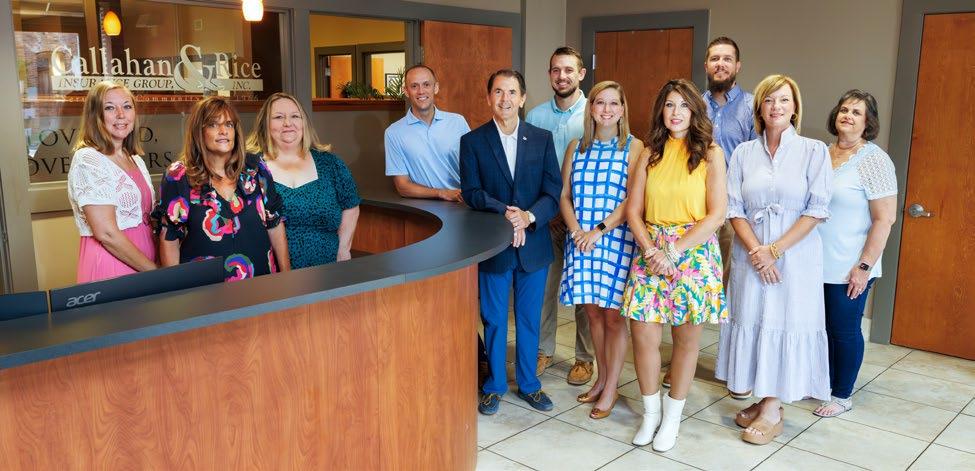
Callahan and Rice is owned by Mark W. Rice, who has worked in the industry for 36 years. His experience includes personal, business, employee benefits, individual life/health and Medicare-related coverage.
Landon Bentham, Mark’s son-in-law, is the director of sales and marketing. He joined the agency in 2015 and has quickly developed his skills in providing quality insurance and risk management services to business owners and individuals. Together, they work with a team of highly skilled professional agents who are committed to helping clients understand and navigate insurance coverage and premiums. Contact the Callahan and Rice team today for your insurance needs. 910-484-6171 | callahanrice.com
129 Franklin St., Fayetteville, NC 28301
French Family Construction began in 2018 as a way for former Marine Matthew French and his wife, Christina, to create a flexible, family-oriented schedule that allowed them to be more available for their five children while still making a difference in the lives of those in their community. They have a small team of employees who have been with the company nearly since its inception.
Christina and Matthew took great care in naming their business; it’s truly a family affair. Since the beginning, their children have cleaned job sites and unloaded materials.
French Family Construction began in 2018 as a way for former Marine Matthew French and his wife, Christina, to create a flexible, family-oriented schedule that allowed them to be more available for their five children while still making a difference in the lives of those in their community. They have a small team of employees who have been with the company nearly since its inception. Christina and Matthew took great care in naming their business; it’s truly a family affair. Since the beginning, their children have cleaned job sites and unloaded materials.
French Family Construction specializes in all aspects of home renovation. Christina loves designing kitchens and bathrooms and seeing a customer’s vision come to life. Matthew enjoys framing decks and room additions, with tile work comes in as a close second. French Family Construction works closely with another veteran-owned business, Onnit Realty, as its preferred contractor. The French family enjoys being part of the Fayetteville community. Their work is widely recognized; they have been nominated for Fayetteville Observer’s Readers’ Choice Awards since the business began. This year, they were selected as one of the top three businesses in five categories: flooring, siding, roofing, windows, and painting.
French Family Construction specializes in all aspects of home renovation. Christina loves designing kitchens and bathrooms and seeing a customer’s vision come to life. Matthew enjoys framing decks and room additions, with tile work comes in as a close second. French Family Construction works closely with another veteran-owned business, Onnit Realty, as its preferred contractor. The French family enjoys being part of the Fayetteville community. Their work is widely recognized; they have been nominated for Fayetteville Observer’s Readers’ Choice Awards since the business began. This year, they were selected as one of the top three businesses in five categories: flooring, siding, roofing, windows and painting.

910-973-2693 | frenchfamilyconstructionllc.com 121 Nairn St, Fayetteville, NC 28311
910-973-2693 | frenchfamilyconstructionllc.com 121 Nairn St., Fayetteville, NC 28311

Chavonne Group is a management company responsible for a growing list of businesses owned by Joanne and Tony Chavonne and their family. “There is nothing more rewarding than owning a local, family-owned business with each family member helping contribute to the creation of jobs and a better community,” Tony said. In addition to founding several Fayetteville-based companies, Tony serves as the chairman of the Board of Directors for the CityView News Fund.

For more than 10 years Grayson Chavonne has served as vice president of Single Source Real Estate Services where he is responsible for all operations of the company. He is a graduate of Appalachian State University, a certified paralegal, and recently acquired his North Carolina real estate license.
Grayson’s wife, Samantha, is a licensed title underwriter who provides her contract services to local title insurance companies. Grayson and Samantha have two sons, Tony III, and Reece.
Tyson Chavonne manages Chavonne Group’s human resources, technology, and operational needs. Also a graduate of Appalachian State University, Tyson has been building new construction homes in the Fayetteville area for four years as Tyson Chavonne Builders. His wife, Tyler, is a licensed attorney practicing real estate law as Tyler Chavonne Law. She also contracts with local private practices as a licensed speechlanguage pathologist. Tyson and Tyler’s property management company, Black Dog Property Partners, owns and operates short-term tiny house rentals in Brunswick County.

Founded in 1930, Jernigan-Warren was helmed by Charles Warren until his passing in 2010 at the age of 93. Daughter Lucy Warren Chambers and grandson Charles “Ben” Chambers continue the family tradition, with Ben following in his grandfather’s footsteps as President and Funeral Director.
Ben grew up watching his grandfather work and learned how to show care and compassion to families during a loss. Finding the best way to memorialize a family’s loved one drives his passion for funeral service.
Lucy Chambers continues the family tradition as VicePresident. Along with a dedicated and experienced staff, Lucy and Ben offer professional and compassionate care in a family-operated atmosphere.
Jernigan-Warren prides itself on serving this great community’s families, just as they have done for 90 years.

Wade Hardin Plumbing Inc. has been a licensed plumbing company since 1983. With a commitment to customer satisfaction, the experienced team goes above and beyond to deliver tailored solutions. Wade Hardin Plumbing Inc. is also a licensed general contractor offering ADA-compliant bathrooms and remodelings. The company’s skilled experts provide a seamless experience for its customers.
From the courteous and dedicated office staff to the service professionals, the crew prioritizes customers and top-notch service at every step. They truly understand the stress associated with plumbing and remodeling issues and aim to make the process as smooth as possible. The goal is to ensure your complete satisfaction, and as such, are ready to address any concerns promptly.
As a local company, Wade Hardin Plumbing Inc. takes extraordinary pride in serving the community and has grown alongside it for the past 40 years. Homes and businesses in Fayetteville and the surrounding area trust the expertise and customer-centric approach.
Wade Hardin Plumbing Inc. is here to handle all your plumbing and remodeling needs, exceeding expectations to provide exceptional service and earn your trust.


Mike and Kim Foust founded Foust Heating & Air Conditioning Inc. in 2002. The company started as a two-man crew that immediately grew with the need for expansion. Today, Foust Heating and Air Conditioning Inc. consists of three departments: new and existing construction, services, and sales, specializing in residential and light commercial systems. The company currently has 23 employees including service technicians, installation teams, a duct fabricator, administrative assistants, comfort specialists, an installation manager, and a superintendent who oversees each installation project along with Mike Foust. They appreciate their employees and the dedication they give to each job. They have several employees who have been with them for 15-20 years.
Foust Heating & Air Conditioning Inc. holds both H-2 and H-3 Heating and Air Conditioning licenses with the state of North Carolina and an SP-PH Electrical license with the state of North Carolina. They are a Customer Care Dealer with American Standard and a Pro-Partner with Rheem. Their number one goal is to provide their customers with complete satisfaction and peace of mind. They treat their customers like family. They genuinely believe in the philosophy of honesty and integrity.
When you call Foust Heating & Air Conditioning Inc., you are not calling a chain business owned by different investors, you are calling a family-owned company that is working for the next generation. With over 35 years of experience, Mike and Kim Foust have made Foust Heating and Air Conditioning Inc. a reputable name by providing exceptional service throughout Cumberland and surrounding counties and by bringing “COMFORT ALL YEAR LONG WITH HONEST, RELIABLE SERVICE.”
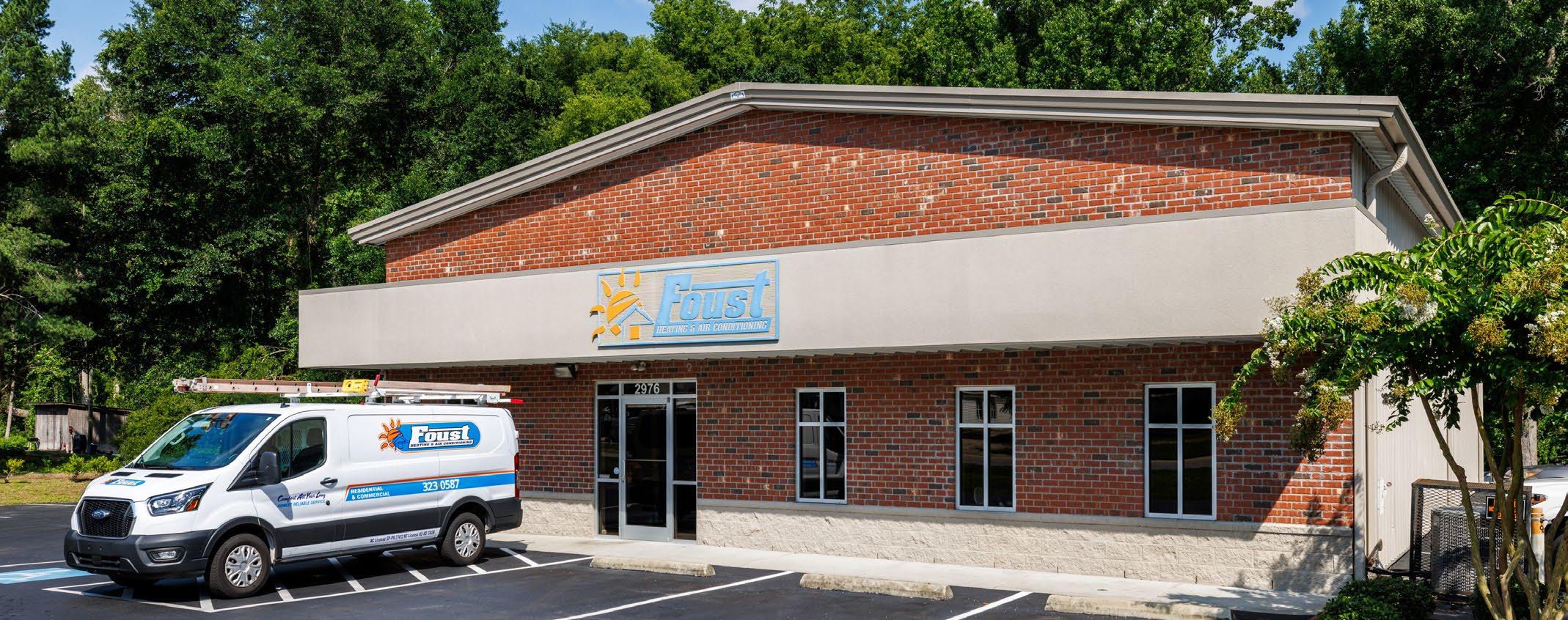


Team Groover at RE/MAX Choice is a dedicated husband and wife team of experienced real estate professionals serving Fayetteville, Raeford, Fort Liberty, and surrounding communities. With a genuine desire to help clients achieve their real estate goals, the team combines decades of industry knowledge with personalized service for a smooth and successful buying or selling experience.
Shari, with 29 years of experience in the local building industry, provides valuable insights on construction processes, market trends, and attention to detail. Her commitment to exceptional service and approachable nature prioritizes client needs.
Shawn, a proud Army veteran with 24 years of service at Fort Bragg, brings a disciplined approach and commitment to service. His familiarity with the area and strong work ethic benefit clients seeking properties near Fort Liberty. Shawn’s negotiation skills and ability to navigate complex transactions set him apart.
Whether you’re a first-time buyer, seasoned investor, or savvy seller, Team Groover is dedicated to guiding you every step of the way.

Holmes Security Systems stands as a beacon of trust and innovation in the security industry, proudly serving eastern North Carolina since 1908. As a family-run business now with its third and fourth generation at the helm, there is over a century of dedication, expertise, and commitment to the community. The Holmes story is one of legacy and evolution, with each generation contributing to the mission of providing exceptional service. Today, Holmes Security Systems provides unparalleled life safety and security services for residents and businesses across eastern North Carolina.
The company’s strength lies in deep-rooted family values, which translate into a personalized approach. From its stateof-the-art, UL-listed 5-diamond central monitoring station — the only one of its kind in eastern North Carolina — to the 24/7 local staffing (where a real person is always available to address your needs), this commitment to local, personalized service sets Holmes Security Systems apart.
The leadership has brought fresh perspectives and technological advancements while honoring the foundational principles established by its forefathers O.W. Holmes and J. D. “Luke” Wheeler. This blend of tradition and innovation ensures that Holmes Security Systems remains at the forefront of the security industry, continuously adapting to meet the evolving needs of our community members.
Trusting your peace of mind to Holmes Security Systems is a vote of confidence in a legacy of safety, reliability, and family dedication.

In an age where corporate giants dwell over the office technology market, Copiers Plus stands as a testament to the power of a local, family-owned business that couples expertise with customer care. Headquartered in Fayetteville, Copiers Plus is more than a supplier of cutting-edge office equipment and workflow solutions; it’s a story of commitment, community, and generational vision.
Founded in 1985 by Bob Smith, Copiers Plus emerged from a deep-seated desire to prioritize customer service over sheer sales volume. Bob, disillusioned by the industry’s prevailing “just sell” mindset, envisioned a company where understanding and addressing customer challenges took precedence. This vision birthed the company’s guiding principle — the “Plus” stands for service!
The first few years were humble but grew to include Bob’s wife, Jackie, and son, Tim, within the first couple of years. Employees often juggled multiple roles to ensure client’s needs were met, including delivering machines in a station wagon and using
boards to unload trucks until a forklift was attainable. By 2000, the company took a leap of faith and relocated to a larger facility off Gillespie Street, tripling its operational space and allowing for greater service capabilities.
Recognizing the growing demand for reliable office technology solutions, Copiers Plus extended its reach beyond Fayetteville and into Raleigh with an office that opened in 2002. This expansion set a precedent for further growth, leading to additional offices in Wilmington, Greensboro, and Asheville. Today, Copiers Plus’s expanded footprint ensures that businesses across North Carolina receive timely, professional support.
Their footprint isn’t the only thing that has grown though, as the business now employs seven family members that span three generations. With a legacy rooted in customer care and community support, this Fayetteville-based business exemplifies how local, family-owned companies can thrive and lead when customers are put first.



Nest Managers Property Management, a local, family-owned business, was born out of Lindsey Pelaez’s need for quality property management services when she and her husband, Marco, purchased their first investment property in 2008. Established in 2015, Nest Managers offers tailored services for landlords, focusing on long-term management of single-family homes, multifamily communities, and HOAs. The company also provides renovation and construction services and facilitates buying and selling transactions through their sister company, Swanky Nests; making it a one-stop shop for real estate investors and area families needing quality property management and real estate services.
Lindsey, leading an all-female team, is passionate about providing exceptional customer service and empowering women in the industry. As a veteran-affiliated company and inspired by Marco’s 29 years of military service, Nest Managers is also committed to giving back to the community it loves by contributing a portion of its management fees to the Intrepid Fallen Heroes Fund and the Hunter Seven Foundation, two noble causes they have supported for years.
A unique blend of services makes Nest Managers a standout in the property management arena, offering top-notch, comprehensive care for all their clients. With Nest Managers, you’re not just getting a service; you’re joining a team that values customer service, quality, and love for their community.


910-483-6210 | oldefayettevilleinsurance.com 1308 Fort Bragg Road, Suite 201,
Olde Fayetteville Insurance and Financial Services is a trusted agency with a rich history dating back to 1955. Founded by Bill Hurley, the company has built a strong reputation based on integrity and exceptional customer service. Under the leadership of Dennis M. Walters, the agency has expanded its offerings to include business insurance, health insurance, and employee benefits, meeting the diverse needs of the community.
As a family-owned and -operated business, Olde Fayetteville Insurance takes pride in its deep roots in the community. The addition of Dennis’ son-in-law, Ty Ross, and daughter, Paige Ross, to the team further strengthens their commitment to serving individuals and families in making informed insurance decisions.
With a dedicated and knowledgeable team, Olde Fayetteville Insurance ensures that every client receives personalized attention and guidance throughout the insurance process. As an independent agency representing 40 different insurance companies, it offers a wide range of options tailored to individual requirements. Olde Fayetteville Insurance remains committed to ongoing growth and serving the Fayetteville community for many years to come. Trust the experience, expertise, and customer-centric approach for all your insurance needs.



As you walk into Boone Trail Fit Body Boot Camp, you will hear the roar of laughter and excitement, along with famous phrases shouted out like, “You can do anything for 30 minutes,” or, “Hard is your friend, easy is your enemy.” They are known for their verbiage, as well as the incredible workouts that get people in tip-top shape.
Celebrating five years of excellence in health and fitness services for the community, Boone Trail Fit Body Boot Camp’s owners, Dinah and David Goodman, know all too well the commitment and dedication it takes to get in shape. Dinah leverages over 33 years of experience in fitness and health by offering extensive fitness and nutrition programs that shred body fat and increase lean body mass, as well as improve endurance and core and cardio strength.
David retired from the Army and Dinah retired from the Navy after having served in both the Army and Navy. Using their military and fitness background, they launched Boone Trail Fit Body Boot Camp and have not looked back since.
This is a journey, not a destination — and the journey is filled with ups, downs, exciting adventures, and challenges along the way. Get your fitness journey started at Boone Trail Fit Body Boot Camp.
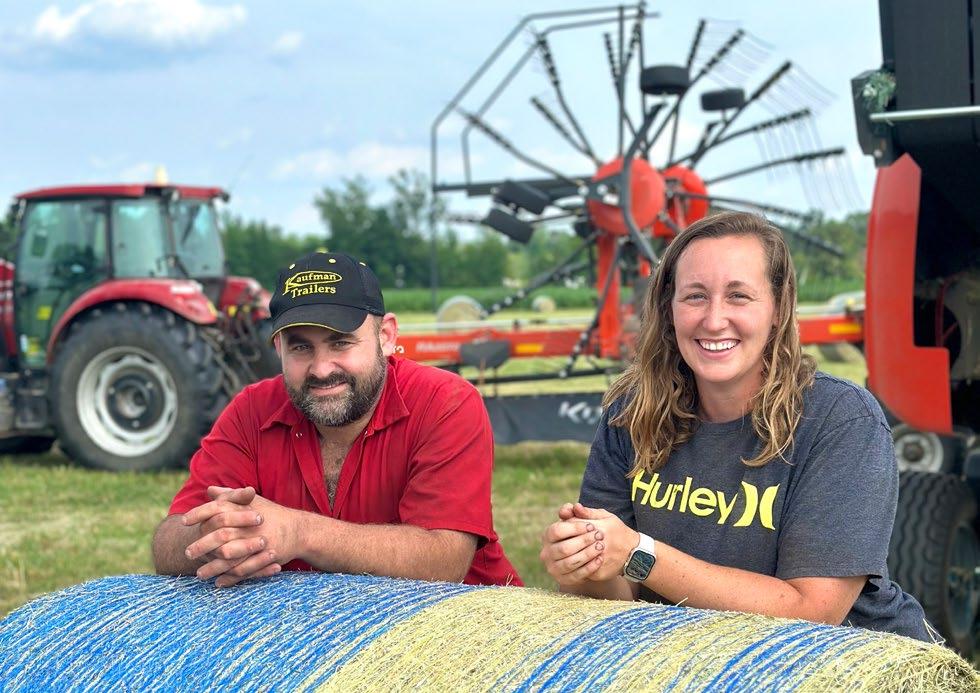

Paige Smart and Ryan Kennedy have been finishing beef cattle on their family farm for brands sold in Whole Foods and Harris Teeter for the last 7 years. This May, they opened S&K Farm Market to sell local, quality beef and open the door for other community members to sell their foods as well. The support and excitement from the community has exceeded their expectations and the little red building is absolutely packed with tons of local goods.
The beef is grass fed and grass finished, available by the beef share (quarters, halves, and wholes), or is for sale by the pound in vacuum-sealed frozen packages. The steaks are tender and well marbled, but the ground beef is what S&K Farm Market gets most excited about.
The market also has local Duroc pork, goat cheese, canned goods, fresh eggs, local baked goods, and flower bouquets.
The most long-distance farm they work with is Homestead Creamery — but their milk and ice cream are worth the haul from southern Virginia.
Come check out S&K Farm Market in Gray’s Creek. Know your farmer, know your food.
Find us on Facebook for the most up-to-date updates.

with sister Donna Hinkamp Warren, and devoted staff, continue to make “good things happen” for customers, old and new. Shop local with Hinkamp Jewelers to experience friendly, ‘no pressure’ service, unparalleled expertise and quality jewelry throughout an extensive selection of diamonds, gemstones, designer and fashion jewelry, watches and more. For beautiful jewelry, custom creations, expert repairs and superior service, trust Hinkamp Jewelers.

Word Count: 98
910-309-0848
3607 Chicken Foot Road Hope Mills, NC 28348
Hodges Advertising Associates, LLC | P.O. Box 53805 | Fayetteville, NC 28305
Small business. Big heart. That’s Hinkamp Jewelers! For nearly 70 years, Hinkamp Jewelers has served customers in greater Fayetteville with the caring touch only a family business can provide. Today, Wally Hinkamp, the second-generation owner, along with sister Donna Hinkamp Warren, and devoted staff, continue to make “good things happen” for customers, old and new. Shop local with Hinkamp Jewelers to experience friendly, ‘no pressure’ service, unparalleled expertise and quality jewelry throughout an extensive selection of diamonds, gemstones, designer and fashion jewelry, watches and more. For beautiful jewelry, custom creations, expert repairs and superior service, trust Hinkamp Jewelers.
201 S. McPherson Church Road, Fayetteville, NC hinkampjewelers.com

Lindy’s, led by Pete Skenteris and his friendly team, offers affordable and delicious food in a warm, family environment. Known for its diverse breakfast options and daily lunch specials, Lindy’s serves up beloved comfort foods like chicken and pastry, pot roast, country-style steak, spaghetti served 10 ways, and even kid-friendly Mickey Mouse pancakes. With a focus on providing quality meals at reasonable prices, Lindy’s ensures that every customer is treated like part of the family. Whether you’re craving a hearty breakfast or a satisfying lunch, Lindy’s is dedicated to delivering a satisfying dining experience that leaves you feeling right at home.
910-485-6247
3001 Raeford Road, Fayetteville, NC 28303








BY TERI SAYLOR PHOTOGRAPHY BY TONY WOOTEN
GGrown from modest beginnings in a local barbershop, a simple school backpack giveaway has blossomed into the blockbuster Gotcha’ Back School Kickoff event for Fayetteville families.
This summer, 400 students from kindergarten through high school will receive a backpack stuffed with items they need to start school on the right foot.
In most communities, the neighborhood barbershop serves up more than a shave and a haircut. It often doubles as a town square, a friendly hangout, and a place where the locals, from politicians to preachers, business executives to blue-collar laborers, grandpas, and little boys can go to freshen up their look and enjoy good conversation.
Sometimes magic happens.
Seventeen years ago, Kevin Brooks, now 54, was a young father and the owner of Trimmerz, the barbershop in Bronco Square on Murchison Road. He remembers commiserating with his fellow barbers and customers over the challenges inherent in stocking his kids’ backpacks for school.


A backpack might seem like a simple thing, but for thousands of children in Cumberland County, it is a necessity that some families can’t afford. And filling them with school supplies is just one more hurdle to overcome.
“At the time, I had one kid in high school, one in middle school, and one in elementary school,” Kevin said. “The back-to-school lists were different for the different educational levels, so my wife and I divided up the shopping, yet we still came up short.”
It took several days of shopping at different stores for Kevin and his wife Gloria to buy the supplies their kids needed to get their school year off to a good start.
“At the barbershop, we realized a single mom or single dad in this situation with three kids would be under a lot of stress having to buy for all of them,” Kevin said. “So, we challenged our clients and each other to help families stock up on back-to-school supplies.”
Operating out of Trimmerz that first summer in 2007, the group gave away 100 backpacks, he said.
It was a simple idea that took off like a rocket, quickly outgrowing the barbershop and Bronco Square and evolving into an annual summertime backpack giveaway and festival. The event has moved around Fayetteville to Festival Park, Fayetteville State University, the Fuller Recreation Center, and Crown Coliseum, Kevin said.
just kept coming,” he said. “They told us we needed to grow the program, and we became more event-driven.”
Over time, Trimmerz added other programs to its backpack giveaway, including a youth leadership event on Martin Luther King Jr. Day and a summer success initiative that paid tuition for kids to go to various local summer camps.
He also launched The Group Theory in 2016, a nonprofit devoted to supporting at-risk youths, ages 12 to 18, and added the Gotcha’ Back School Kickoff to its menu of programs.
“The barbershop started doubling as everything,” Kevin said.
When Covid-19 shut everything down, Trimmerz, like other businesses in Fayetteville and beyond, was stopped in its tracks. For Kevin, it was an eye-opening experience and gave him a moment of reckoning. At the age of 50, he took stock.
“It was the first time I had ever stopped cutting hair for that long,” he said. “I had been having some leg and foot problems, and all this caused me to consider what the rest of my career might look like.”
He launched Build Your Self, a community violence intervention program, using his pandemic downtime to start creating its curriculum. Today, the program is in its
We realized a single mom or single dad with three kids would be under a lot of stress having to buy for all of them. So, we challenged our clients and each other to help families stock up on back-to-school supplies.
— Kevin Brooks
This year, the annual Gotcha’ Back School Kickoff takes place at 11 a.m. Aug. 17 at True Vine Ministries. The event features community service programs, a job fair, voter education activities, music, vendors, and food.
Kevin started barbering as a young kid. He never considered making it his career, but it fit his personality and gave him a sense of purpose.
“At Trimmerz, I was able to interact with the community, and we welcomed everyone who walked through the door,” he said. “Inside, our customers could interact, learn what’s going on in town, and leave a little different, even if that just meant getting a new haircut.”
Kevin said he’s always been drawn to community service and advocacy for those he says are doing hard, important work — particularly teachers. It seemed fitting to use his barber shop as a platform to help elevate the community and inspire participation from local residents.
“When we started giving away the backpacks, people
fourth year and is offered through The Group Theory.
In 2021, Kevin sold Trimmerz, retired from barbering and began running The Group Theory full time.
Building key partnerships has been key to his success.
“While we are a small organization, we stay very busy,” he said. “Our theme is ‘common unity,’ and our goal is to decrease the gaps between the need for assistance and access to it.”
One of his service partners is Christen Miller, 36, a mental health professional and former bank employee who founded F.E.L.P. (Future Endeavors Life Program) in 2014 as a youth development nonprofit.
Christen provides targeted mental health and educational programs for community service organizations like The Group Theory and recruits youth volunteers to staff special events including Gotcha’ Back. In turn, participating kids can earn their mandatory community service hours.
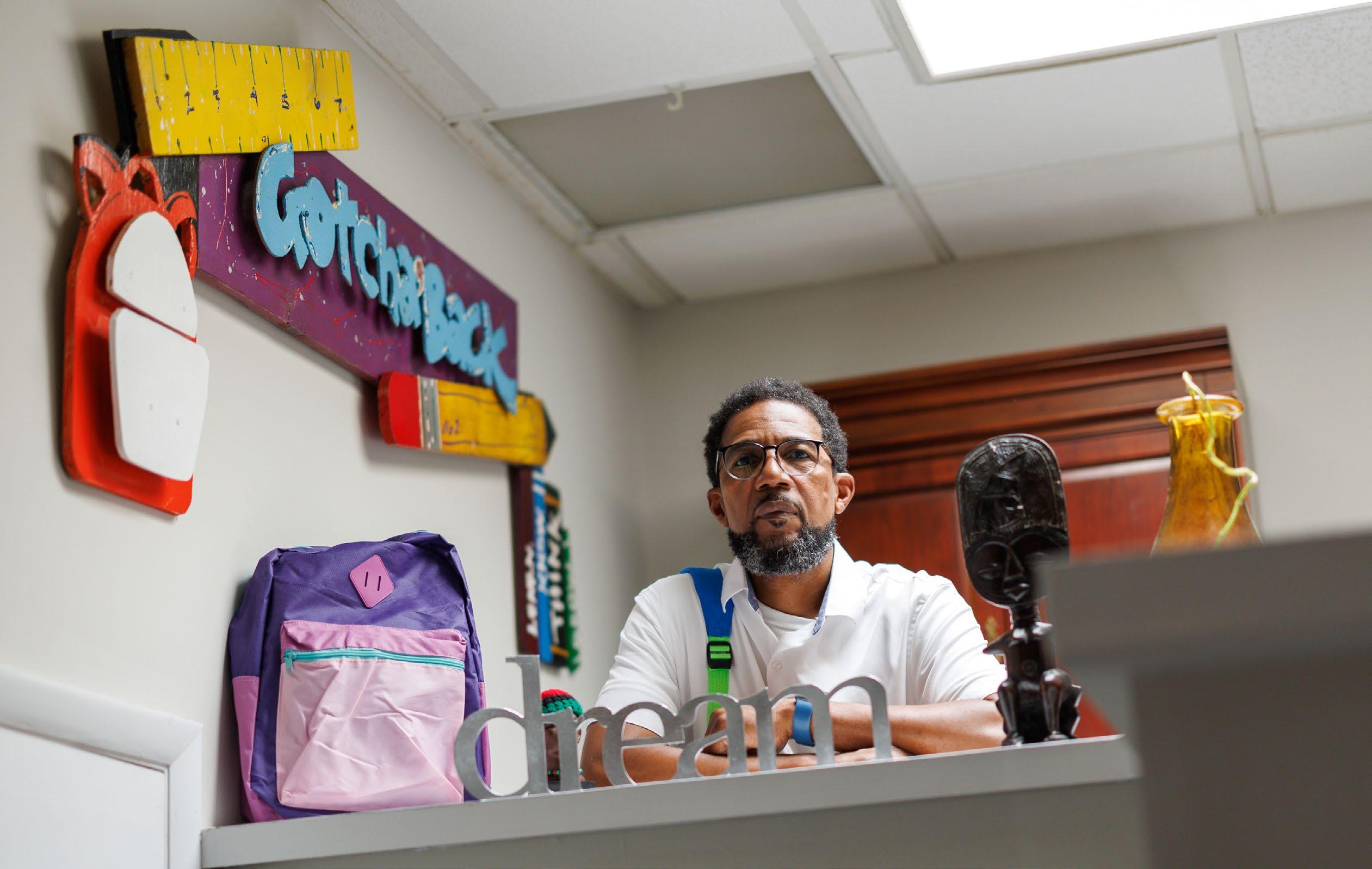


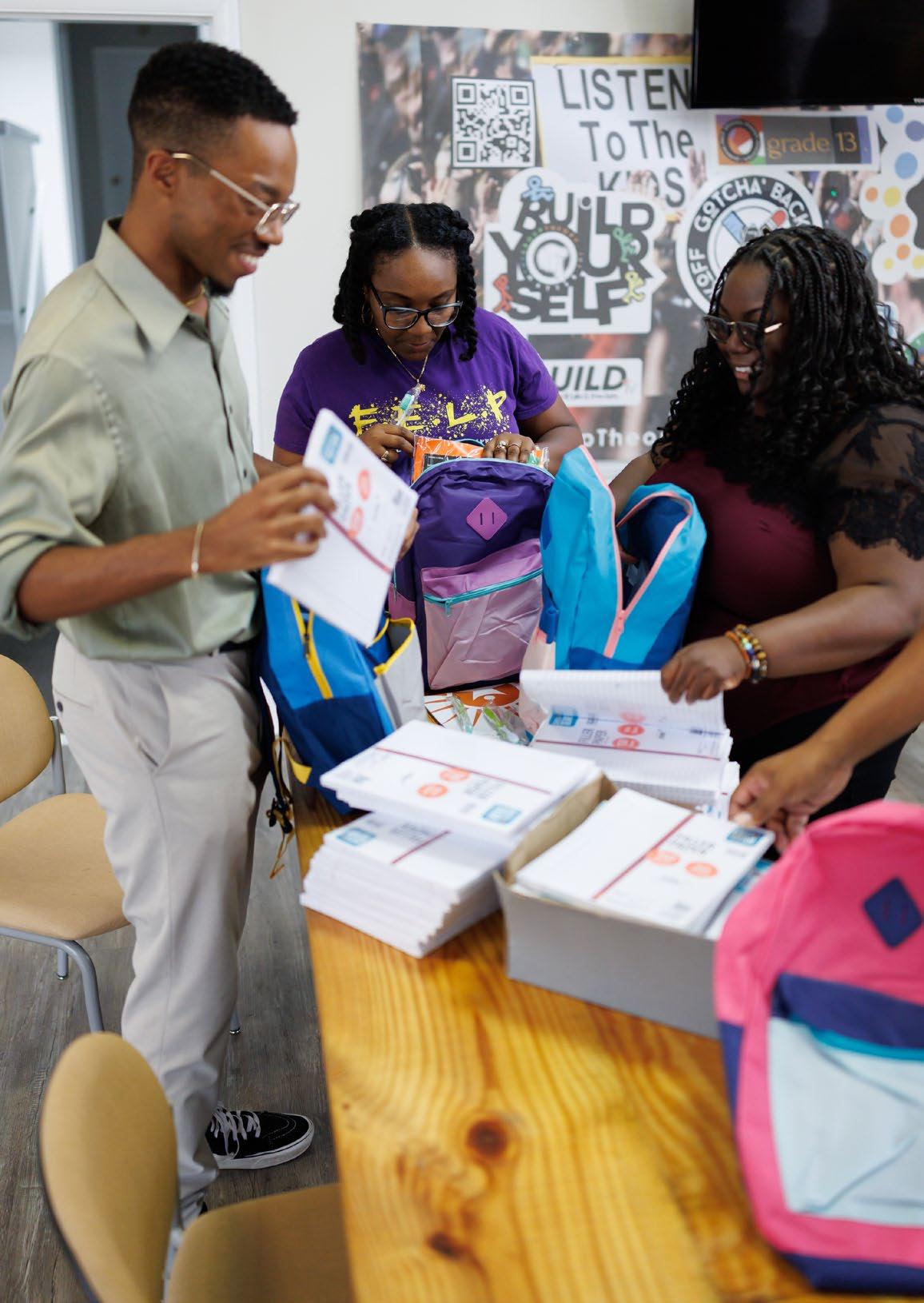
“I primarily work with at-risk youth ages 10 to 17 focusing on entrepreneurship, basic life skills, mental health, physical health, and education,” she said. “Someone told me I needed to go meet Kevin, and one day I just popped into his barbershop, and we started collaborating.”
Christen said she started her nonprofit on faith and made it into a success.
“We’ve reached our 10th anniversary, and now the young people the program served in the beginning are adults and are coming back to volunteer with us,” she said.
Also this year, for the first time, the Fayetteville Alumnae Chapter of Delta Sigma Theta Sorority will hold its third annual Candidates’ Fair at the Gotcha’ Back to School Kickoff.
Amanda Williams, 58, first vice president of the nonprofit service organization says the kickoff is a good way to reach a broad audience, particularly for increased voter engagement.
“We know that hundreds of kids will come out to get a backpack, and their parents will be driving them,” Amanda said. “People tend to be kind of apathetic because they sometimes don’t feel like their vote is not going to make a difference, but we believe if we can reach even a few people who have never voted before, then we are moving in the right direction.”
A hallmark of the Sigma Delta Theta Candidates’ Fair is the opportunity for voters to meet one-on-one with local politicians running for office.
“Voters don’t often have the opportunity to sit face to face with candidates on the ballot and ask them questions about issues that are important to them,” Williams said. “We want parents to understand that all politics are local, so it is important not only to meet the person who might be representing them on the school board, we want them to understand that they do lose their voice when they don’t cast their vote.”
The event will also focus on new and aspiring voters and includes a voter registration drive targeting high school students.
“Kids that are 16 can register now, even though they have to wait until they are 18 to vote, but if we get them registered, it will plant a seed in them,” Kevin said. “It’s not too early to help them make the connection between who they vote for and how voting impacts their daily lives.”
For Kevin, the timing for this expanded event is important because he feels the stakes have never been higher.
“We are not doing a good job of investing in our young people,” he said. “Among other problems, we’re taking money away from our public schools and raising teacher pay by 4% is not enough.”
In addition to the Candidates’ Fair and backpack giveaway, Kevin has invited representatives from local service providers, including substance abuse counselors, relationship counselors, the county parks and recreation department, law enforcement, and many others.
Over the years, Kevin and The Group Theory have not strayed far from their roots at Trimmerz. His office is in a small sunny space on Murchison Road, right across the street from Fayetteville State University and near Bronco Square, where Trimmerz is still in business.
“I met most of the people I know from right there in the barbershop,” he said. “I’m fortunate to have an office nearby and the opportunity to maintain the relationships I have in the Murchison Road corridor.”
Murchison Road stretches from downtown Fayetteville to Fort Bragg. “Anchored by Fayetteville State University,” a historically Black university founded in 1867, the corridor is “known as the historic center of African American culture in the city,” according to the city of Fayetteville.
The city of Fayetteville is at work on plans for revitalizing the corridor by expanding housing and improving the road. Kevin believes there is a need for much more, including a full-service grocery store that stocks healthy, affordable, fresh food and other necessary venues and services.
“Many of the things that anybody would expect to have in their community are lacking here,” he said. “In addition to being a food desert, we don’t have a doctor’s office, a lawyer’s office, or a bank.”
Kevin works to help fill some of the gaps he sees through his programs, partnerships, and service on local boards and committees. Last spring, he was among four Cumberland County leaders selected to participate in a nine-month national juvenile justice initiative sponsored by the National Association of Counties’ Juvenile Justice Innovation Network.
Through Group Theory, Kevin partners with other organizations to extend the backpack giveaways beyond the school kickoff event, and participates in four or five events during the summer. One of these events is a Back-toSchool Pop-Up to “shop with local vendors” on Aug. 10 next to the Rowan Skate Park on Rowan Street, hosted by a team of young people.
All told, Kevin and his partners will distribute as many as 2,000 backpacks at Gotcha’ Back and other events throughout the summer. Kevin reckons his organization has distributed approximately 10,000 backpacks full of supplies and 20 new bicycles since launching the program in 2007.
It is a labor of love.
“I love people and I love this community,” he said. “We are a strong advocate for alleviating the problems that have caused our residents to be underserved, and we are just as worthy as any other community to thrive.”
As for Kevin, he’s walking the walk and making a difference, one backpack at a time.

If you’re going: The event takes place at 11 a.m. - 3 p.m. Aug. 17 at TrueVine Ministries.
Number of backpacks to be given away: 400 backpacks for kids in grades K-12.
Number of backpacks distributed across the Gotcha’ Back program’s lifespan: Almost 10,000.
Local organizations partnering with The Group Theory: Fayetteville Alumnae Chapter of Delta Sigma Theta Sorority and F.E.L.P. (Future Endeavors Life Program)
Number of volunteers stuffing backpacks: Nearly 25. Items in each backpack: Notebook paper, pencils, composition books, crayons, highlighters, rulers, pens, toothpaste, toothbrush, and soap.
Other giveaways: The Group Theory has given away 20 brandnew bicycles in conjunction with the Gotcha’ Back School Kickoff event.
What is new this year: The Fayetteville Alumnae Chapter of Delta Sigma Theta will hold its annual Candidates’ Fair leading up to the November 2024 elections.
Other giveaways: The GroupTheory is holding a special giveaway on Aug. 10 at the Backto-School Pop-Up market at Skate Park to distribute 20 custom laptop backpacks to students participating in games and exercises.
How to help: Volunteers, age 16 and over needed to facilitate games, hand out backpacks, and assist vendors.
For more information, email thegrouptheoryinc@gmail.com.
Cumberland Community Foundation Scholarship Manager
Kimmi Nettles highlights the impact and hyper-local nature of scholarships
BY TREY NEMEC | PHOTOGRAPHY BY SHARILYN WELLS
AAs higher education costs skyrocket, students often grapple with difficult decisions about paying for college. Should they take out loans? Rely on scholarships or grants? Work part-time and pay out of pocket?
In making the transition from a freshly minted high school graduate, they’re daunting options.
Kimmi Nettles, scholarship manager at Cumberland Community Foundation, a nonprofit that funds a variety of community betterment projects, knows firsthand how intimidating navigating the college financial system can be. In the process of going to college, she said she was never aware of scholarship opportunities — now, she’s aiming to change that in Cumberland County.
In her new role, she works to ensure that students in this community carry a lighter financial burden as they pursue their post-high school education.
“My goal is to make sure that every student in a Cumberland County school knows about the scholarship program,” Kimmi said, smiling through her dark-rimmed glasses.
Daughters of a single mother, Kimmi and her twin sister Kim, had to pave their own way through school at Troy University in Alabama, taking out student loans, working part-time jobs, and relying on Pell Grants.
“I did not have a scholarship and I can imagine how much easier my college life would have been,” Kimmi said. She also navigated her first two years of college without a car, relying on rides from friends to get to class.
Reflecting on her experiences, she emphasized how easy it would have been to give up on the goal of graduation. Kimmi persisted, and along with her sister, became the first in their family to earn college degrees. She can still recall the pride she saw in her parents after she crossed
the stage with the class of 2000, earning a degree in business with a concentration in marketing.
Receiving a scholarship can be a gift to a student and their family, she maintains, and can help to alleviate a lot of financial stress brought on by the expenses of higher education. Through her work, Kimmi also showcases the importance of access to scholarship resources for students, believing those resources can help to change the community and the world.
Through her role at the foundation — which she began in June 2024 after former Scholarship Manager Susan Barnes retired — Kimmi works with the students who are applying and the scholarship committee members who make the selections. One scholarship, established in honor of the 90th birthday of Janie Chavis Lucas, a Cumberland County resident, is awarded to high school seniors who are active in at least two school organizations. The scholarship has helped four students go to college so far. Scholarships such as this highlight the hyper-local impact that community members have on the students of Cumberland County.
“We have donors who are not rich in wealth, but rich in community, rich in faith, and rich in love for the Cumberland County community,” Kimmi said.
CCF President/CEO Mary Holmes described Kimmi as “fun, funny, smart and capable,” saying she knows the foundation’s donors and grantees — “and how to help them achieve their goals.”
“She understands our donors because she is very generous herself,” Holmes said, pointing out that Kimmi created an endowment in memory of her mother that sends children in need to summer camp. “Now, she’s the perfect person to lead our scholarship program. She’s well-organized and knows how to run a good program.

to know about the scholarship program.



• $1.1 million awarded in 2024
• 61 scholarships available Scholarships awardees are selected by a panel, trained to select awardees in an unbiased way, while adhering to donor requirements
Kimmi put herself through college, so she knows how important scholarship awards can be to students. She is very motivated to make the world a better place.”
By advocating for students and ensuring donor’s wishes are carried out, Kimmi and a panel of scholarship recipient selection members, who are trained to select awardees in an unbiased way and adhere to each scholarship donor’s guidelines, work to enable many students who may not have otherwise had the opportunity, to pursue their degrees.
Through over $1 million awarded this year across more than 60 scholarships, FAFSA enrollment events, and community outreach efforts, Kimmi highlights the impact that these resources can have on students, and shows that Cumberland County is full of people who are kind, care about each other, and want to help better the community for future generations
Trey Nemec is a senior at Fayetteville State University, majoring in communication and media studies. Along with interning for CityView, he serves as the editor-inchief of FSU’s The Voice, a student-led newspaper.


SERVING FAMILIES SINCE JUNE 1974
Ask us about open skate sessions
SCHOOL FUNDRAISERS
Call for availability
BIRTHDAY PARTIES AND GROUPS OF ALL SIZES


Let us do all the work, you have all the fun! f www.round-a-bout.com

Sign up for CityView’s free newsletter “CityView Today”! Every Sunday, we send out a magazine-focused newsletter recapping the month’s magazine, including Senior Columnist Bill Kirby Jr.’s Sunday columns, events, and obituaries. We also send out newsletters Monday through Friday about the week’s news. Scan the QR code to sign up!
PARENTS


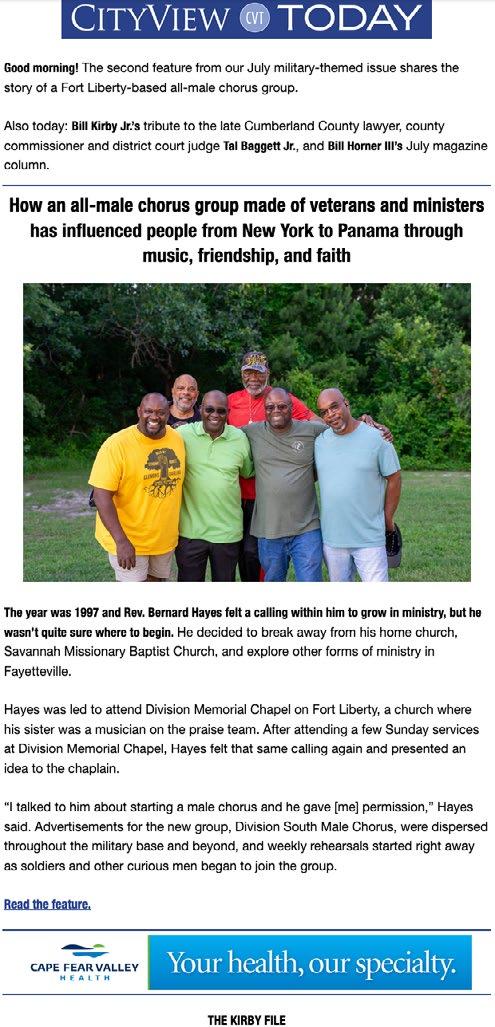



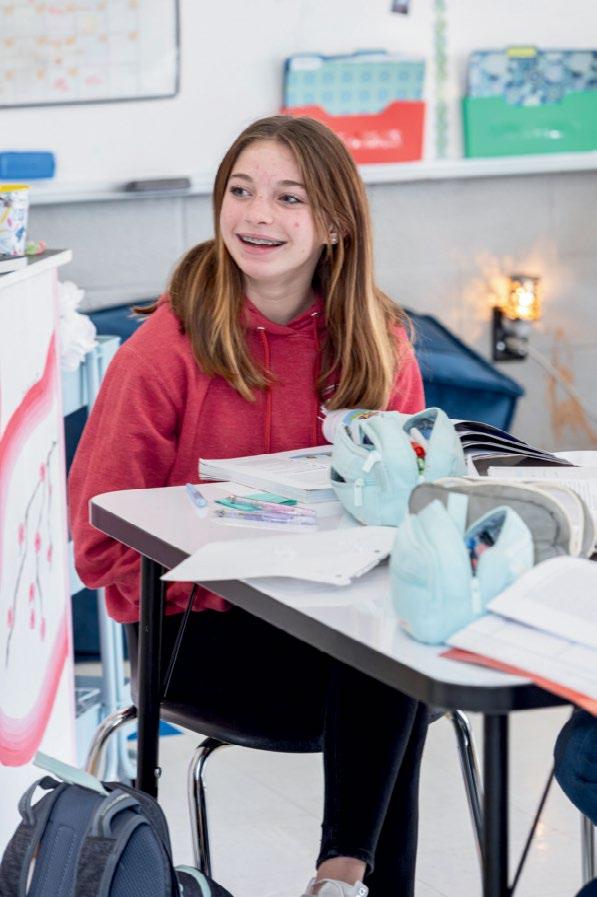
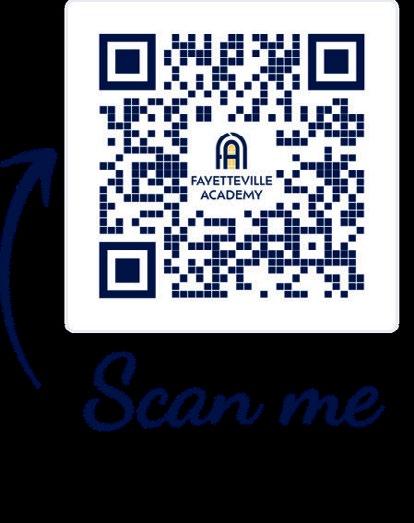
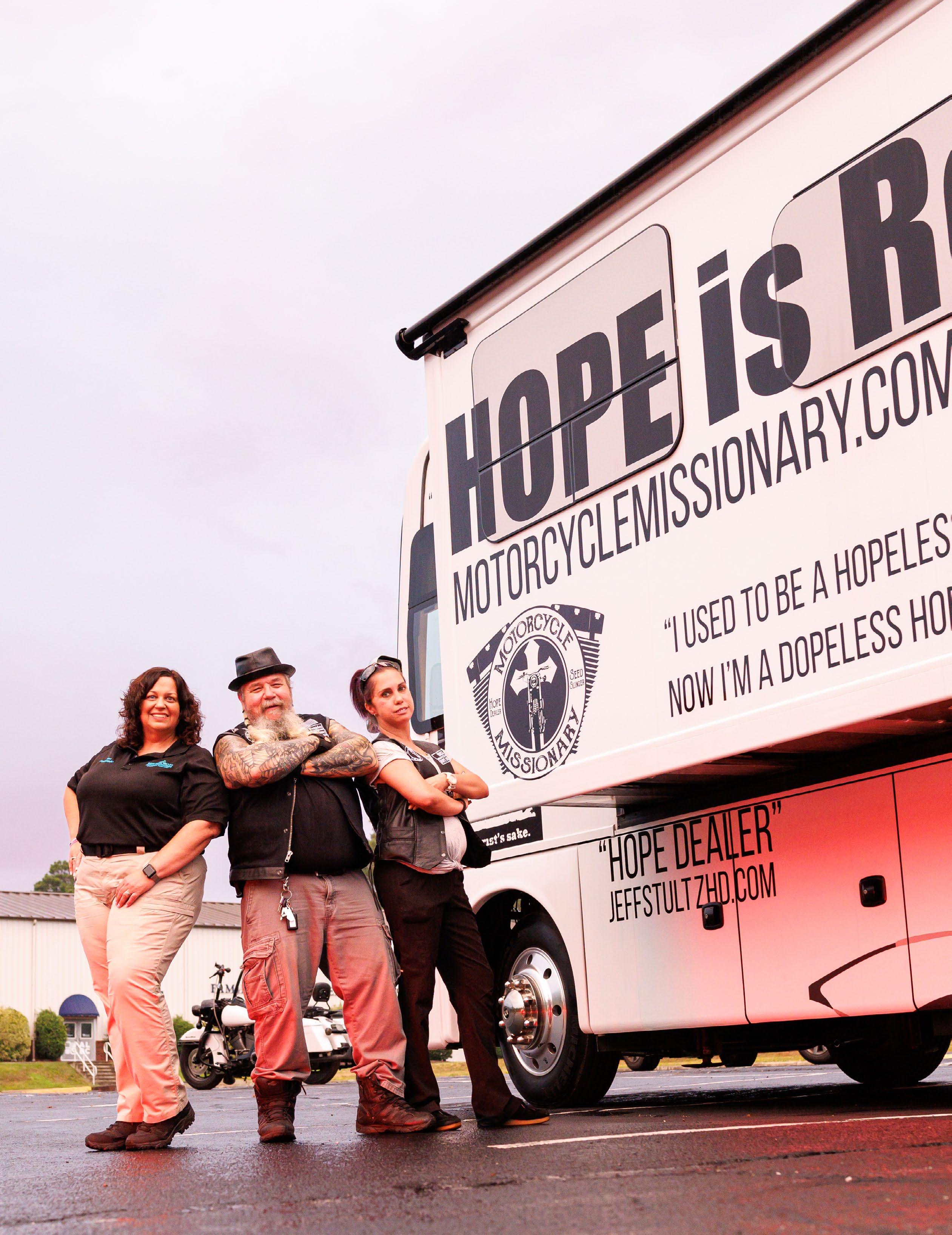
Connecting with community resources is key to helping participants and enhancing their lives
BY JAMI MCLAUGHLIN
PHOTOGRAPHY BY TONY WOOTEN
IIt might start with a 911 call, but for the Behavioral Health Community Paramedic Program, they are on the ground to give more than a normal emergency response and transport.
The team of four community paramedics, one social worker and one peer support specialist are trained to help fill in the gaps in care and reduce trips to Cape Fear Valley Health’s emergency department. Whether at home or through referrals to one of their vast community partners ranging from mental health agencies to county resources, the paramedics work outside the hospital, meeting patients where they are and giving proactive patient care.
Community Paramedic Tara Tucker, 51, knows exactly what is needed as a behavioral health community paramedic, especially when it comes to at-risk patients who call emergency services.
According to the Cape Fear Valley Health website, the goal of the Community Paramedic Program is “to improve patient care by providing community paramedics to serve as an advocate for the patient at all times.”
“Sometimes it’s like we are connecting the dots of health and social services," Tara said.
Community Paramedics assist by helping patients schedule appointments, assessing any in-home risks, educating the patient on their condition, assisting in medication management, allowing for in-home care testing, and navigating community resources.
“Sometimes we just find people need someone to hold their hand and navigate them through our health system,” Tara said. “Once we give the roadmaps, it makes it all so much easier to connect with the services they need and the relationships we build helps us figure out where they need to go.”
Tara said her path started after she graduated with an undergraduate degree from UNC-Chapel Hill in recreation therapy in 1995. Her first job was working in a locked "psychiatric ward" at the Moses Cone Health System inpatient behavioral health department in Greensboro, North Carolina.
Lately, she has been speaking at health conferences all over the country including Ohio, Maine, Pennsylvania, and throughout North Carolina to share what she has learned as a subject matter expert. She has been invited to speak at audiences in Kentucky and New Jersey as well.
“My background is mental health and substance use,” Tara said. “When I went back to school to get medical training, I was able to see the vast disconnect between mental health and first responders.”
She said first responders are trained to address traditional emergency medical issues. However, she has been able to have a different perspective to look not only at physical health, but also emotional, social,
mental, and behavioral needs.
The Community Paramedic Program includes medical teams to reach people with chronic health issues such as chronic obstructive pulmonary disease (COPD) and congestive heart failure, according to Tara, but her team works on the behavioral health side.
The program focuses on what are known as “social determinants of health,” Tara said. These are nonmedical factors that affect individuals’ health, for example, like “being unhoused, or being homeless, or having psychiatric issues without getting regular therapy or needed medicine,” she said.
Tara said that her team helps decipher if people are calling 911 for medical reasons, or if they need more resources like getting food or managing diabetes.
“We are able to have a different perspective with the ‘whole person’ approach,” Tara said. “Sometimes we find that they are calling 911 because they don’t have a primary care doctor or don’t know where or how to get help. We can assist with getting those who call with the resources they need.”
That “whole person” approach could include understanding that someone needing help managing diabetes might also need resources to get their prescriptions filled or transportation to appointments, she said. Or those dealing with addiction might not know the available resources, even without insurance, which leads to frustration, she added.
Getting to the root of an issue is important, Tara said.
“The behavioral health system is so vast and disconnected,” she said “We sometimes hear that someone wanted to get better, but they didn’t know how. That’s where we try to help.”
This “whole person” approach is something Tara said she learned in her first job at the inpatient behavioral health department in Greensboro.
“It was when case management was a new concept,” Tara said. “We made sure things were lined up for patients before they left the hospital, giving them a list of resources with phone numbers to call. When I left, I started working with an ACT team (Assertive Community Treatment) and started seeing the actual resources in person.”
After 10 years working with ACT in Greensboro, which Tara said was “like a hospital without walls” with case workers, nurses, and other medical professionals, she went back to school at Lenoir Community College to become a paramedic in 2011.
“I was able to take the training and experience I had, that most paramedics do not have, to build relationships and get all partners working together,” Tara said. “And when community partners come together, the impact grows exponentially.”
She said that the community partnerships and the
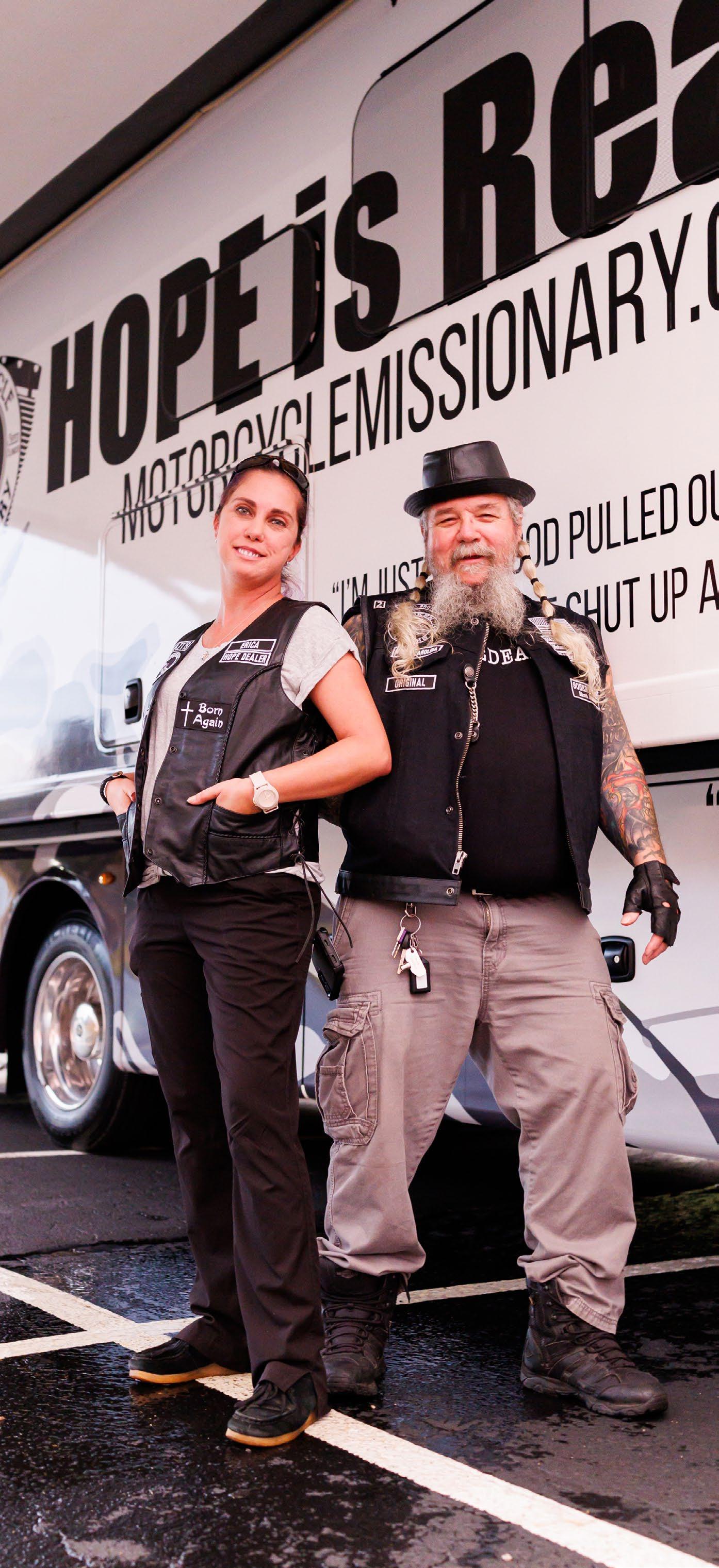
relationships made are the most profound and important piece to the program.
“It’s all about relationships,” Tara said. “Once we get that first situation, the medical crisis, resolved, we can then follow up and find out what the needs are to link them with the resources from the relationships we have built in the community.”
She said it is that first step, that first door, is imperative to helping the community paramedic team facilitate the hundreds of referrals they receive a month from police, fire, and emergency services departments so they can serve as many people as possible.
“We try to find those gatekeepers,” Tara said. “We had one man who we heard about through 911, and he went from hopeless and unhoused to getting a job within three weeks. He took the roadmap we laid out and did everything on it. This is why we do what we do. He was able to turn his life around.”
Fayetteville resident Erica Lugo, 37, is sober due to Tara’s efforts.
“I should not be here,” Erica said, as she spoke about her prior addiction to OxyContin and fentanyl.
She said she decided last September that she needed to live for her son and for herself. At that point, she tried to quit cold turkey and began to go through harsh withdrawal symptoms, she said.
“I felt like I was dying and my son called 911,” Erica said.
She recalled her first visit to the Cape Fear Valley Health’s emergency department being short, as her immediate symptoms were treated and she went back home. The next night, still feeling ill, she said she returned, but this time a paramedic contacted Tara, who was in the waiting room ready to meet with Erica when she arrived.
“She was like an angel sent from heaven,” Erica recalled. “If it weren’t for her, I wouldn’t be here today.”
Erica said that Tara set up her first appointment to help her on the way to get clean, came to her house, drove her to it and still calls her monthly to see how she is doing.
“I have my nine months chip now and I know there is a purpose for me still to be here,” Erica said.
Tara said the paramedics help create safety nets through community partnerships and relationships, which help assist those
who need them with resources to make their lives better.
“For instance, we may have a hundred calls of suicide ideation or attempts each month through 911, but when they go home, those problems still exist whether it’s addiction, an ended relationship, or financial issues,” Tara said. “We can’t stick our heads in the sand after they leave our care.”
One of the ways that Tara and her team are building those nets is by creating community partnerships, including suicide prevention and addiction recovery groups.
For example, Tara works with Broken Chains JC, a fellowship of bikers and motorcycle enthusiasts that has a mission to offer hope in healing through a Christ-centered recovery process. The faith-based group is now in all 50 states and 15 countries, and has 6,000 members, according to Jeff Stultz, founder and national director.
He and Tara met at a community event a little over a year ago and realized they could work together to serve the community.
“No one across the nation has thought about pairing paramedics with bikers, but we did,” Tara said. “We found awesome partners. They reach those local recovery communities we serve with a support system and sober activities.”
Jeff, 61, is a motorcycle group member who speaks through experience and recovery.
He started Broken Chains JC in Cumberland County, he said. Jeff is 17 years sober.
“There’s a segment of the population that responds to people like me,” Jeff said referring to his long hair and tattoos. “People in suits, or even uniforms, can be perceived as scary or judgemental. You don’t even recognize they are trying to help you.”
Jeff graduated from Seventy-First
There’s a segment of the population that responds to people like me. People in suits, or even uniforms, can be perceived as scary or judgemental.
High School in 1981, and joined the U.S. Army shortly after, following in his father’s footsteps. His road to recovery and sobriety is a long way from his days in the Army and riding with a motorcycle club in his early 20s “that took me down a dark place.” At that time, he also began using illicit substances, he said.
Jeff eventually went AWOL from the Army, turning himself in later. He recalled a period of experiencing homelessness and substance use addiction as among the lowest moments of his life, he said.
“We talk the talk and want to help keep people alive until they are ready to live,” Jeff said.
His group offers two recovery support groups, which Tara refers to often along with a fuller list, which participants can choose from.
One is Celebrate Recovery, which meets every Friday at 6:30 p.m. at 455 Rock Hill Road, Fayetteville at the Freedom Biker Church. The other is Recovery Alive, which meets at 5:30 p.m. every Monday at Arran Lake Baptist Church, 1130 Bingham Drive, Fayetteville. Recovery Alive’s sessions begin with a free dinner, worship, and group sessions and include free childcare.
Tara said that, according to research, most people start trying to get help through their church clergy so she has begun partnering with the faith community to train
and partner.
She emphasizes recovery options, which can be faith-based or secular, she said, providing participants with agency of choice.
Another one of the ways that Tara and her team are helping is by hosting a Mobile Outreach event every third Thursday from 10 a.m. to 2 p.m. at the Kingdom Impact Global Ministries Church at 2503 Murchison Road in Fayetteville. Resources with over 70 community partners are available with a free lunch, medical screenings, laundry services, free haircuts, HIV and hepatitis C testing, and more.
“Some take for granted what just a simple haircut can mean to someone,” Tara said. “It takes all of us working together and there are a lot of providers coming to serve.”
To learn more about the Cape Fear Valley Community Paramedic program including how to get involved or support, visit capefearvalley.com/emergencyservices/community-paramedic. html.
Jami McLaughlin writes features for CityView Magazine. Jami can be contacted at jmclaughlin@ cityviewnc.com
The graded school system in Fayetteville and its first superintendent Alexander Graham became examples for the rest of the state in the late 1800s.
BY REGGIE BARTON
Alexander Graham has been called the father of the graded school system of his hometown of Fayetteville, of Charlotte, and of the state of North Carolina. The histories of Alexander and of the local school system are justifiable sources of pride for Fayetteville.
In early years, educational opportunities in and around Fayetteville were primarily available through private schools. These schools required payment of a fee or tuition, and thus they tended to be populated with students from families of at least a moderate degree of affluence and from white families. In addition, it seems there was no particular system for dividing students into classes based on age or educational level. Many of these private schools were chartered by legislative act, going as far back as the Fayetteville Academy in 1799. Others followed, among them the Fayetteville Female School of Industry, Ravenscroft Academy, and the Donaldson Academy and Manual Labor School.
After the Civil War, a movement in support of graded public schools gained momentum across North Carolina — graded in order to separate students of different ages into different classes, and public to indicate at least partial funding from local governments. It was in this milieu that Alexander Graham came to prominence.
Alexander had strong family roots in Cumberland County. His paternal grandparents immigrated from Scotland, ultimately settling in the late 1700s in the Long Street section of the county (on what is now Fort Liberty). His parents, Archibald and Anne McLean Graham, moved into Fayetteville where Archibald was a tailor and dry goods merchant. The family home was downtown on Maiden Lane across the street from where Cumberland County Public Library currently stands.
Alexander received a private school education in Fayetteville and then served in the Confederate army, according to the Dictionary of North Carolina Biography. Gen. William Tecumseh Sherman’s army captured Alexander, but released him at the close of the Civil War.
After the war, Alexander taught briefly in Bladen County before enrolling at UNC-Chapel Hill where he earned a bachelor’s degree in 1869. He then moved to New York City, teaching Greek while studying law at Columbia University. He obtained his bachelor of laws degree in 1873. He returned to Fayetteville to practice law; it was there that his interest in graded public school education blossomed.
In Fayetteville, support for public schools at that time was evidenced by editorial comments that appeared in the North Carolina Gazette, a local newspaper. In its Jan. 10, 1878, edition, the Gazette bemoaned that good schools all over North Carolina could “be patronized by only people of means” and that to date the public school effort in North Carolina had been a “disastrous failure.” In closing, the article stated: “… the toilers and the laborers — ‘the bone and sinew’ — where is the provision for their benefit? Not a single large public school, not a single graded school, in Fayetteville.” Later that same year, the impetus for public education received an unexpected boost among Fayetteville’s white citizenry from a rather intriguing situation.
In “Our Early Graded Schools and Their Founders,” an article by M. C. S. Noble in The High School Journal, that situation is recounted. It seems that during the summer of 1878, an affray occurred in Fayetteville resulting in a court trial. At the trial, called to be witnesses were 11 young boys, six of them Black and five of them white. The Black lads signed their names to their testimony; however, the white lads signed with an “x,” or some other marking. The article posits that this difference reflected the education received by the Black students at the Howard School — precursor to Fayetteville State University, which was established in 1867 with backing from the Freedmen’s Bureau, the American Missionary Association and the Peabody Fund. The episode astonished and humiliated the white citizens, whereupon they “in their humiliation and shame, determined to place a good school within reach of all the white children of the town.”
“… the toilers and the laborers — ‘the bone and sinew’ — where is the provision for their benefit? Not a single large public school, not a single graded school, in Fayetteville.”
– North Carolina Gazette, Jan. 10, 1878
The white citizenry of Fayetteville immediately mounted a subscription campaign for the cause of public education, raising about $3,000. An appropriation was also received from the Peabody Fund and a small amount from North Carolina’s public education fund. In its Aug. 29, 1878, edition, the North Carolina Gazette reported that existing school buildings, the Donaldson Academy (Haymount), the Female Seminary (Hay Street) and the Mission School House (Campbellton section of town), had been selected to house the new school system.
But the paper further reported no school superintendent had been selected by the school’s board of trustees. That vacancy was soon filled as a result of another somewhat unexpected “turn of events.” The initial trustees for the new graded school system were leading citizens of the town, Alexander Graham among them. According to a letter written by Alexander, referenced in Hometown Heritage by Lucile Miller Johnson, at a meeting of the trustees to consider appointment of a superintendent, several candidates were nominated; but after several ballots, no nominee had received a majority vote. The stalemate in the voting was broken by the nomination of Alexander. As it happened, Alexander was not in attendance at the meeting. Not being there to refuse the nomination, he was thereupon elected superintendent in absentia. Fortunately, he agreed to serve.
The Fayetteville system of graded public schools went into operation in mid-September 1878. The faculty included Alexander, as well as seven other instructors.
Newspaper articles from across the state, like the Goldsboro Messenger, lauded the success of the initial, and subsequent, years of operation of the Fayetteville schools. One notable comment quoting Alexander, which appeared in the Fayetteville Examiner, said, “The children of the rich and poor sit side by side and contend for the same honors.” Much credit for this success was accorded to Alexander.
As often happens, experience and success lead to new opportunities. In 1888, after 10 years of service in Fayetteville, Alexander was offered and accepted the position of superintendent of the Charlotte Graded Schools — a position he served in for 25 years.
In addition to his positions as superintendent of schools in Fayetteville and Charlotte, Alexander Graham’s
accomplishments over the years were legion. Here are just a few of them:
• President of the North Carolina Education Association
• Trustee of A&T College at Greensboro
• Distinguished historian, including work to establish the authenticity of the Mecklenburg Declaration of Independence, according to the Fayetteville Observer
• First person in North Carolina to put high school studies in a graded school (Fayetteville, 1878), according to his eulogy in the Greensboro Record
• Founder of the first manual training school in North Carolina (Charlotte, 1892)
• First person to canvass the state in order to promote establishing graded schools
• First person to ask that females be accepted at UNC upon completion of high school
• Vigorous opponent of cigarette smoking which he banished in the schools
• Advocate for affording educational advantages to Black students and strong supporter of the Second Ward School, Charlotte’s first public high school for Black students
One of the first public school buildings built in Fayetteville, Central School, was constructed at the corner of Burgess Street and Maiden Lane, the site of Alexander’s childhood home. Whether this was an intentional nod to Alexander is not known. However, when a new high school on McGilvary Street was dedicated in 1924, it was named in his honor. In later years, that building and the former Fayetteville High School building on Robeson Street together comprised Alexander Graham Junior High. Both buildings were later torn down.
In 1915, the Weekly Observer of Fayetteville reprinted an article from the Charlotte Observer that contained a sterling tribute to Alexander: “That one man — despite political differences, despite the rise and fall of factions, despite the out-croppings of resentment at this act and that, despite machinations, despite criticism — should be able to retain for 25 years that most vulnerable and delicate of posts — superintendent of schools — and through it all should be able to keep true to his educational ideals and build a school system that is the admiration of the State — surely that fact carries its own commentary on the unique ability of Alexander Graham — scholar, diplomat, teacher, politician, historian, patriot and Southern gentleman.”
Alexander Graham, native son of Fayetteville, died on Nov. 2, 1934. His death was headline news across North Carolina. He is buried in Elmwood Cemetery, Charlotte.

Reggie Barton is a native of Fayetteville. He is a graduate of Davidson College and UNC-Chapel Hill Law School.
BY ARIA SPEARS

Most parents in my growing up years followed, without realizing they were doing so, the four research-driven suggestions for a play-based childhood.
Social psychologist Jonathan Haidt offers these suggestions for raising digital-ready kids in his recent book, “Anxious Generation: How the Great Rewiring of Childhood is Causing an Epidemic of Mental Illness.”
But years before I read Haidt’s book, had done a military move or birthed a military child, the only thing I knew back in the summer of 2003 was that I desperately wanted to start a dog-washing business.
The place: our house in the Missouri Ozarks. Rolling hills, dogwoods, a neighborhood nestled alongside a nature preserve. Deer, wild turkeys, and kids free-ranged through yards of split-level homes. While simply trying to manage enough quiet to make a few phone calls at the end of the day, my parents (along with most parents of the time) managed to follow Haidt’s first suggestion: “More unsupervised play and childhood independence.” For us, that took the form of dirt piles and scooter races.
But it translated indoors, too. Only the family computer in the living room was connected to the internet. I had access to the old, leftover computer in my own room with no internet and only basic word processors.
To jumpstart “Wag, Walk & Wash,” my proposed dogwashing business, I needed a logo. While meticulously piecing together Microsoft Word letters, circles, squares, and rectangles into a motley, perky dog, I experienced the benefit of Haidt’s next suggestion: “No smartphones before high school.” In classic millennial fashion, nonscrolling-related computer activities provided tools to experiment, create, and test out ideas.
Putting my sales skills through the wringer, I next traversed the houses along our giant hill, clad in an ironon logo T-shirt, with homemade flyers and our wagon for transporting pups. My older sister came at my parents’ request and we rang doorbells. “No, thank you,” we heard over and over again. My sister remained determined on my behalf. But the dog printed on my shirt drooped.
We had one final house, that of a schoolmate. I swiveled back around when the mom said, “Yeah, sure. You can wash our dog.” The thrill of meeting our inaugural canine
quickly flipped, however, when my eyes rested on a rather old and sad-looking poodle.
The poodle tottered home in our red Radio Flyer wagon. I soon discovered she was warty, too. Still, cringing but determined, I finished the wash, holding her out at arm’s length to gently place her — fresh and clean, as promised — back in her four-wheeled carriage. She gazed glassyeyed at the sunlit surroundings on her ride home. The mom handed me a crisp $5 bill, which I tucked into my pocket with a smirk of satisfaction. I parked the wagon back in the garage and stashed the rest of my flyers. Old poodles weren’t the customers I had envisioned.
With a pitiful arc to the rise and fall of my hopeful enterprise, looking back, I’m thankful my parents and community (by virtue of it being 2003) inadvertently followed the final two suggestions: “Phone-free schools” and “No social media before 16.” (Well, I got a desktop Facebook at 14.) My idea “failed,” but no one outside my family knew. And I still got $5.
An advocate for child protection, responsibility, and independence, Haidt writes, “Our kids can do so much more than we let them. Our culture of fear has kept this truth from us. They are like racehorses stuck in the stable. It’s time to let them out.”
Haidt points out that giving kids more independence in the real world works better when communities work together to make it happen. Though you might be a fresh face on your street, other military families stare down similar challenges: All military kids need safe, positive ways to engage with a real-world, trusted community.
At the start of this school year, why not start a conversation with a neighbor, school group, or friend to brainstorm ways to help your kids cultivate more independence — together? And why not brainstorm with your children (or nieces and nephews with parent permission) about ways you might support them in giving back or taking on new challenges in the real world?
Maybe it won’t be a dog-washing business. But it will be something.
Only time — and the freedom to try — will tell what they might tackle next.
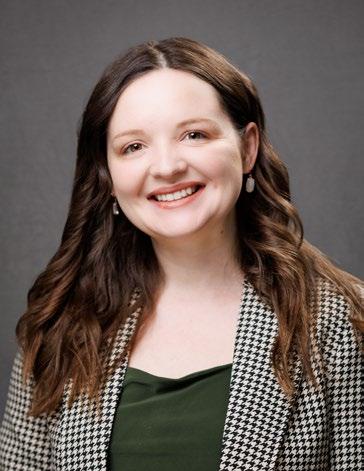
Aria Spears is a freelance copywriter and civic leadership enthusiast. She can be contacted at hello@ aria-writes.com






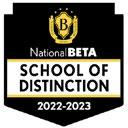



BY DIANE PARFITT





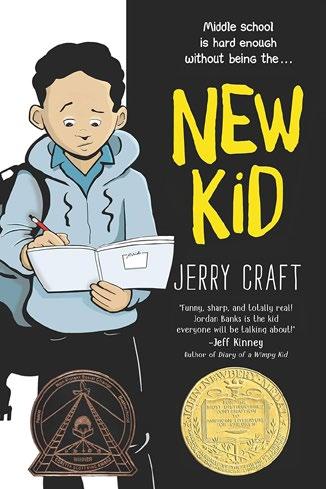

The arrival of August means summer is more than halfway over, with so little time to squeeze in some last-minute vacation fun. The start of school brings both happiness and dread. For students, it means they will get to see friends they haven’t seen all summer, but it also means the beginning of all that schoolwork. For parents, things will be a little quieter around the house, but it also brings some sadness if it’s the little ones headed off to school for the first time.
For parents and children, there are some great things you can do to ease the transition. For parents of the youngster going to school for the first time, you can read some books together that will help them get ready. The kids will be super excited for a new adventure, and you will know that you are sending them off well-prepared. Older children can read books about the challenges that other kids have faced starting at a new school or just learning how to make every day at school matter. Here are some books and graphic novels for every age group to help them through the last days of summer before school starts again.
1. Pippi’s Unforgettable First Day of School by Brittany Anderson (author), Kate Hubaidulina (illustrator)
Pippi is all ready for her first day of school — her backpack is filled with all the things she thinks she needs, and she is brimming with excitement. But when things don’t go like she planned, is she able to adjust — or will she just plunk down and give up? This beautiful book shows that useful lessons can be learned just from dealing with everyday life at school.
2. Kindergarten, Here I Come! by D.J. Steinberg (author), Mark Chambers (illustrator)
This picture book (with stickers!) is a wonderful way to introduce the rising kindergartener to everything about school — first-day jitters, class parties, meeting new people, and all those new but fun things about school. The author uses poetry and rhyming along with beautiful pictures to help prepare the child.
3. Surviving High School: A Novel by Lele Pons and Melissa de la Cruz
Internet superstar Lele Pons gets together with bestselling author Melissa de la Cruz to write this funny and lovable novel about the ups and downs of high school. Teenager Lele Pons is an internet celebrity and has 10 million followers. When she goes to a new high school, will her good looks and winning personality win her a whole new group of friends? Or will she face a daunting set of challenges — the novel’s blurb reads, “the relentless drama, the ruthless cliques, the unexpected internet celebrity,”
a new crush — all while trying to keep her grades up and make her parents proud? High school can be hard, and this heartwarming story will help teenagers see they are not alone in facing challenges in their lives.
4. Wonder by R. J. Palacio
Diversity can come in many forms. Going to a new school is hard enough, but if you have any kind of physical difference, it can be devastating. August Pullman’s face is deformed by a congenital condition that has resulted in his never going to a mainstream school until the 5th grade. He just wants to be an ordinary kid, but the other students can’t see beyond his different face. Told from various points of view — Auggie, “his classmates, his sister, and her boyfriend,” the novel’s Amazon blurb reads — these perspectives give us a view of the “community’s struggle with empathy, compassion, and acceptance. In a world” with an epidemic of bullying, can this story of a child with visible differences teach more about kindness and caring? This book inspired the Choose Kind movement, a movie, and a stunning graphic novel.
5. Each Kindness by Jacqueline Woodson (author), E. B. Lewis (illustrator)
Winner of a Coretta Scott King Honor and the Jane Addams Peace Award!
“Be kind” was my mantra with my own children and I try to remember this every day, even now. This book has a powerful anti-bullying message for children, reinforced with amazing art. When new student Maya arrives at Chloe’s school, the girls ignore her. The snubs hurt and, after a while, Maya stops going to school. Their “teacher gives a lesson about how small acts of kindness can change the world,” the book’s Amazon description reads. Will Chloe and her friends take this lesson to heart and realize “how much better it could be if they had shown a little kindness toward Maya”?
The more that you read, the more things you will know. The more that you learn, the more places you’ll go.
6. New Kid by Jerry Craft
Winner of the Newbery Medal, Coretta Scott King Author Award, and Kirkus Prize for Young Readers’ Literature. Jordan is going into 7th grade with a dream of going to art school. Instead, his parents send him to an elite private school where he is one of just a few students of color in his whole class. While navigating between his own neighborhood and the upscale private school, Jordan feels like he no longer fits in anywhere. This middle school graphic novel is a wonderful choice for tween readers as they navigate their own new feelings.
7. New School, New Friends: Aydin’s Mindset Matters by Eiman S. Altahif
Aydin is going to a new school, and he worries that he won’t be able to make new friends. His older sister, always caring for Aydin, explains that he can
do it. He can learn new things, meet new friends, and become resilient. Still, Aydin wonders, “Can I?” This sweet book shows that if we put our mind to it, we can overcome the struggles we face in new situations.
These books are aimed at preschool to high school students, but I found myself so touched by the various messages they shared. This is one of the joys of reading books to kids, but also to yourself.
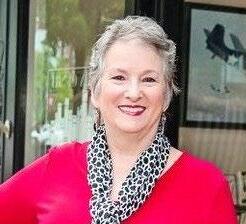
Diane Parfitt owns City Center Gallery & Books in downtown Fayetteville. She can be reached at citycentergallerybooks@gmail.com.

Our FACES of Fayetteville publication provides a great opportunity to share the faces and stories of our community. With its new moreinteresting format and its year-long distribution throughout Cumberland County, this year’s FACES of Fayetteville issue will reflect a great community and the people making it happen.
CityView is excited to celebrate the stories and FACES of Fayetteville!
Email sales@cityviewnc.com to reserve your spot in CityView's FACES of Fayetteville special annual profile publication by September 6.

Here are just some of the things happening in and around Fayetteville this month. Scan the code with your phone for more events, additional information and to post your event on our website. Events are subject to change. Check before attending.
Aug. 17
I Love My Community Giveaway & Black BBQ Cookoff 2024
A1 Cook Offs, Crown Complex 1960 Coliseum Drive crowncomplexnc.com
Aug. 17
Super Hero 5K
Fort Liberty Fairgrounds 1500 Howell St., Building F-4208 Fort Liberty liberty.armymwr.com
Aug. 18
Dirtbag Ales’ Farmers Market
5435 Corporation Drive, Hope Mills facebook.com
Aug. 22
United Way’s Annual Meal Packing Event
United Way of Cumberland County
Crown Expo Center 1960 Coliseum Drive unitedway-cc.org
Aug. 23-Sept. 24
Alpha Romeo Tango (A.R.T)
Cape Fear Studios
148 Maxwell St. capefearstudios.com
Aug. 23
4th Friday Downtown Fayetteville Hay Street visitdowntownfayetteville.com
Aug. 29
2024 State of the Community Greater Fayetteville Chamber
Crown Complex Ballroom 1960 Coliseum Drive chamber.faybiz.com
Aug. 30-Sept. 8 2024
Cumberland County Fair
Crown Complex 1960 Coliseum Drive crowncomplexnc.com
Aug. 31
String Quartet performance Symphony on Tap
James Creek Cider House 172 US-1 Hwy., Cameron fayettevillesymphony.org
Aug. 31
Play Music on the Porch Day Hope Mills Lake
3609 N. Main St. playmusicontheporchday.com

$5





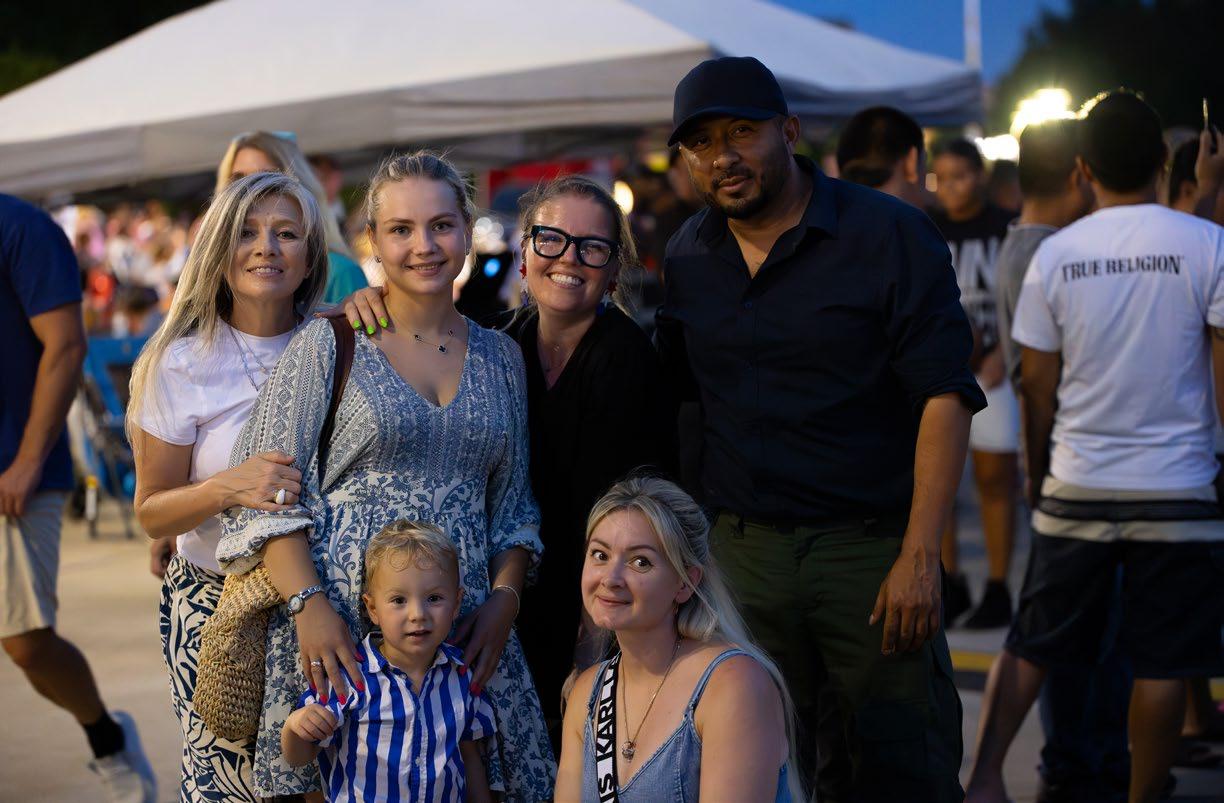
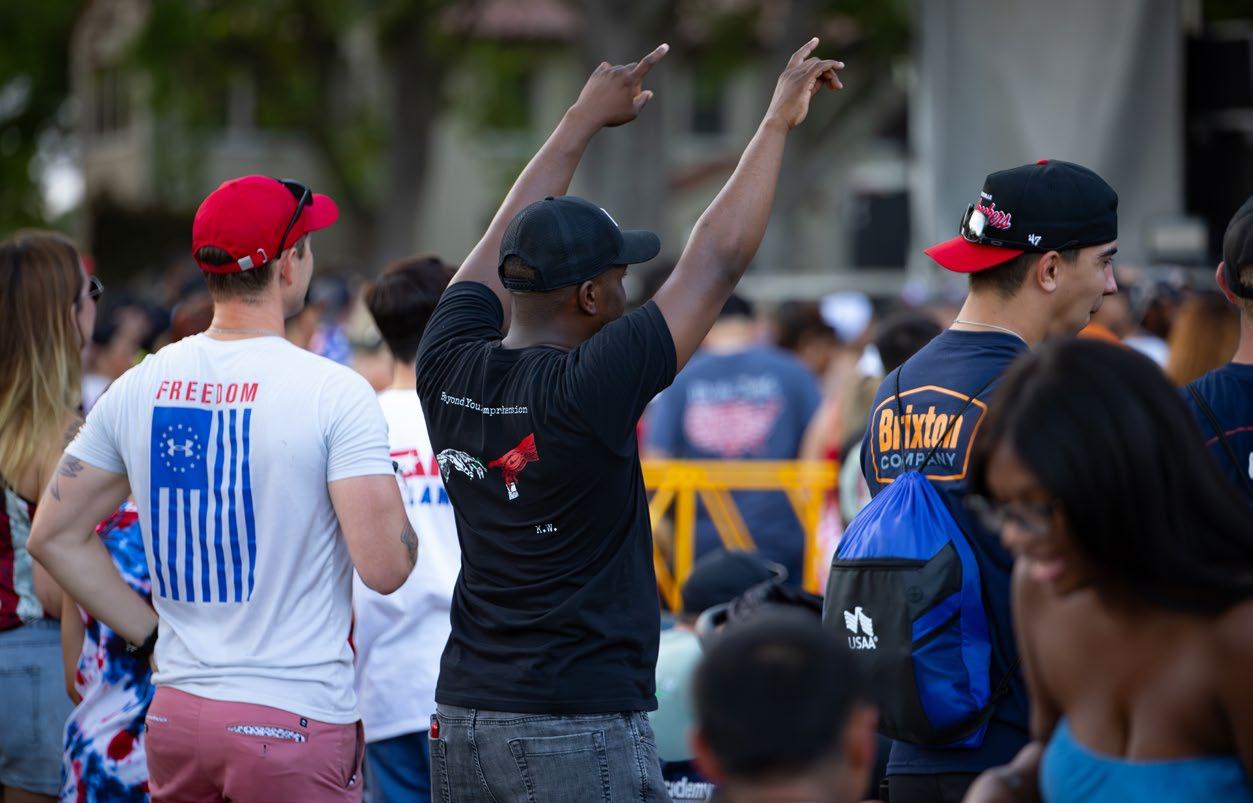
Independence Day Concert with FSO: For the 4th of July, the Fayetteville Symphony Orchestra and the city of Fayetteville put together an Independence Day Concert with food vendors and beer. The concert was held from 7-10 p.m. at Festival Park. CityView photos by Oriana Evans 4th at the Fort Celebration: Music superstars Flo Rida, Plain White T’s, and Maddie & Tae performed on Fort Liberty. CityView photos by Oriana Evans

PRIDEFEST 2024!: Fayetteville PRIDE hosted its fifth annual PRIDEFEST 2024! with live entertainment, vendors, food trucks, art projects, and more. CityView photos by Aaliyah Lane 1 2 3 4 5 6


1 Ukrainian Efforts organization members, Independence Day Concert
2 The crowd enjoys the show, 4th at the Fort
3 Aaliyah Sanders (left) and Sierra Bermudez, PRIDEFEST 2024!
4 Jaime Pompilli, PRIDEFEST 2024!
5 Independence Day Concert
6 Flo Rida performed at 4th at the Fort event.


COMING NOVEMBER 14

coming October 10 at Cape Fear Botanical Garden

Do you know someone in our community who quietly goes about helping others? Who gives selflessly and works behind the scenes to improve the lives of those around him or her? We want to hear about these amazing people.
CityView Magazine is soliciting nominations for our fifth annual Power of Giving Community Impact Awards.

Go to cityviewnc.com to submit a nomination. The deadline for nominations is Sept. 2. Winners will be selected by a panel of judges and recognized during a luncheon in November.




Thursday, Nov. 30 from 5-7
Friday, Dec. 1 from 5-7
Saturday, Dec. 2 from 10

Thursday, Dec. 7 from 5-7 PM
Friday, Dec. 8 from 5-7 PM
Saturday, Dec. 9 from 10 AM - 5 PM
Our Christmas Home Tour is in two of our neighborhoods, the first two weekends in December on Thursday, Friday, and Saturday.
We are offering interest buydowns starting as low as 4.5% buydown for the 10 move-in ready models during this Christmas Parade of Homes Tour.
You are invited to celebrate the season with the Floyd Christmas Open House. Come see the exquisitely, decorated homes and all of our latest features. Pick up your gift from under our tree and enjoy a glass of eggnog while sharing holiday food, fun, and cheer with us.
Discover timeless luxury at this brand new community of townhomes built by Floyd Properties; owned and operated by Lennox Townhomes, LLC. Lennox at Haymont showcases our executive townhomes with exquisite finishes and superior construction, redefining high standards. Centrally located in desirable Haymount, our 70 years of home-building expertise ensures a residence that stands the test of time. Welcome to a legacy of refined living.
Scan for information and directions.




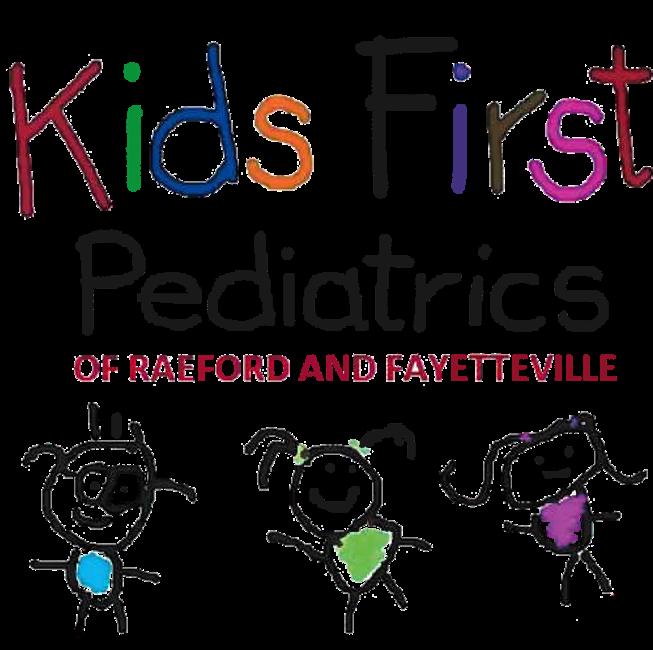
www.kidsfirstpedsraeford.com
Kids First Pediatrics of Raeford and Fayetteville has created a professional and caring medical environment for infants, children, adolescents and their families. We provide complete pediatric and adolescent care.
Pediatric Services We Provide Check Ups, Sick Child Visits & More in Raeford and Fayetteville
• Well Child Visits
• Sick Child Visits
• Vaccine & Immunization Schedule
• 2023-2024 Guide to the Flu
• School, Sports, & Camp Physicals
Mon. to Fri., 8 a.m. to 5 p.m.
910.848.KIDS (5437)
• Autism Spectrum Disorder
• Vaccines & Immunizations
• ADHD Testing & Treatment
• Asthma Symptoms & Treatment
• Breastfeeding Support
• Urinalysis
• Strep and Mono Screen
• Vision and Hearing Tests
Brookstone Lane, Ste. 101 Fayetteville, NC 28314 Mon. to Fri., 8 a.m. to 5 p.m. 910.306.KIDS (5437)
Jose Buenaseda, MD, FAAP
Leamor Buenaseda, MD, FAAP
Sreelekha Sashidhar, MD, FAAP
Christine Arnold, CPNP-PC
Melanie Pitts, DNP, NP-C
Beverly de La Rosa, CPNP-PC
Danielle Trigg, CPNP-PC
Cinthia Follrod, CPNP-PC
Rachelle Olson, FNPC
2694 NC 24-87 Cameron, NC 28326
Mon. to Fri., 8 a.m. to 5 p.m.
(5437)
Brookstone office only 8 a.m. – 12 p.m. Saturdays for sick/urgent appointments, established patients only.

The Cape Fear Valley Blood Donor Center is the only community blood program dedicated to serving the needs of Cape Fear Valley Health patients in Cumberland, Hoke, Harnett and Bladen Counties through blood donation by individual donors, community organizations and businesses.
Cape Fear Valley Blood Donor Center offers local volunteers an opportunity to Save Lives Locally. Located at 3357 Village Drive in the Bordeaux Shopping Center, the center is is open for donations Monday through Friday from 9 a.m. to 5 p.m., and the third Saturday of each month from 9 a.m. to 3 p.m. There are also two blood mobiles out in the community for mobile blood drives. Find those blood drives by scanning the QR code.
For information about donating or hosting a blood drive, please call (910) 615-LIFE (5433) or visit savingliveslocally.org.
